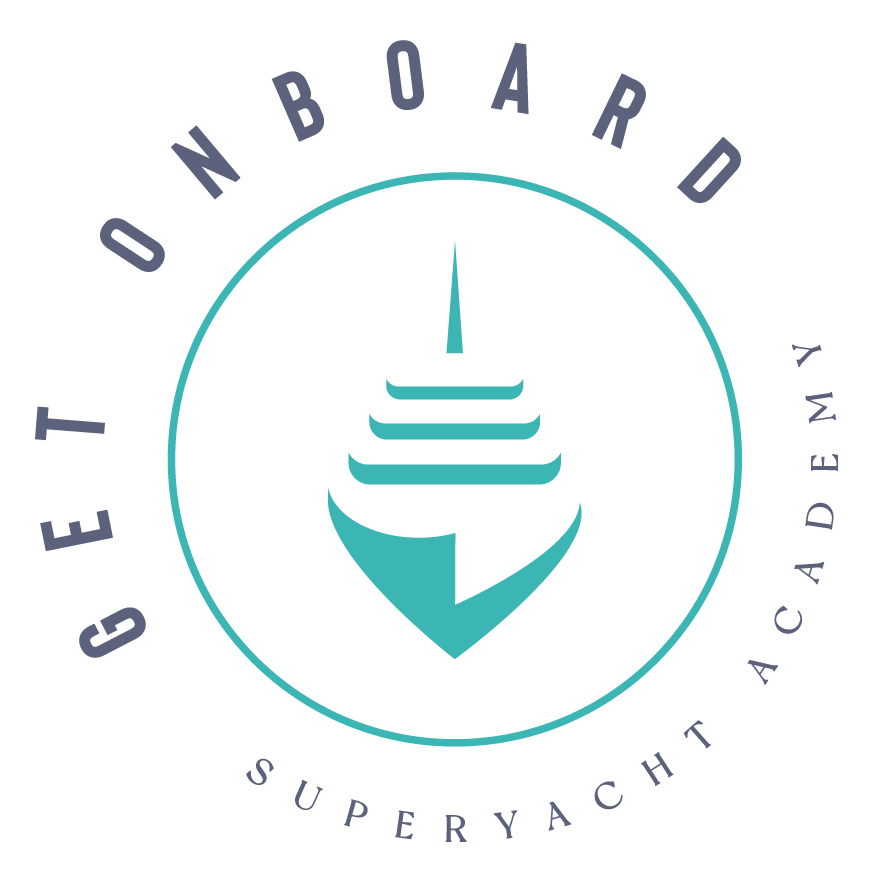
Get Onboard
Superyacht Training
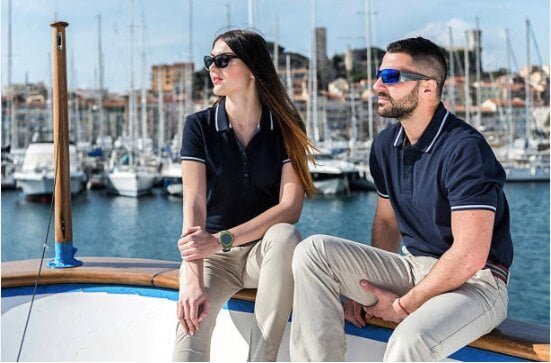

How to Work on a Superyacht, with no Experience
Working in the superyacht industry looks like the dream job, right? But, how do you get started with no work experience? With over 12 years in the industry, interviewing and hiring countless candidates across various positions, we know first hand what information you require to get your first real crew job on a superyacht. In this post we highlight some of the features of our “Beginners Guide to Yachting” Ebook which explains all you need to know from how to get your CV yacht perfect, typical daily stewardess or deckhand duties, how to find day wo rk, and more.
What kinds of entry level positions could I apply for?
The two most common entry level positions on yachts are stewardess and deckhand jobs. These are both junior ranks whose primary concern is to keep the guests happy and ensure the interior and exterior are kept immaculately clean.
What previous experience is useful when looking for a job on a yacht?
While working on a yacht is certainly different to any land-based career, there are a few land-based jobs that would have equipped you with skills useful on a vessel. Jobs that may be useful include:
- Hospitality-related jobs
- Waiting tables in a high-end restaurant
- Child care or au pairing
- Carpentry
- Sports or diving instructor
If you have already completed some form or degree or diploma in engineering or mechanics, this is also considered a huge plus.
Are there specific qualifications I need?
Yes. You will need an STCW 10 certificate to understand basic safety protocols, as well as an ENG1 Medical Certificate to prove that your health is in good enough shape to join a vessel. Get Onboard Superyacht Academy offers complete STCW and ENG1 training in Cape Town, South Africa. These are the only compulsory documents needed, but if you are interested in a specific role, we offer specialised courses to equip you for these.
How do I get my first job on a yacht?
Once you are qualified, follow these steps:
- Construct a CV. Be sure to include all relevant information and documents, as well as a friendly, yet professional photo of yourself. Download our free template for a starting point.
- Pick a location to start. Antibes in France, Palma de Mallorca in Spain, and Fort Lauderdale in Florida are great places to start out as a newbie.
- Find some day work. This is work outside of a formal contract, which may involve helping out for a day to several weeks. Day work is an excellent opportunity to network, build contacts in the industry, and get a foot in on your journey to securing a more permanent job.
How much money do you make working on a yacht?
The standard entry level salary for a junior stewardess or deckhand ranges between €2,000 – €2,500 or $2,300 – $2,800 per month. This amount is generally tax free, although the onus is on each crew member to check with their home county about tax obligations. Certain countries are tax exempt, provided you spend more than six months out of the county.
Check out our salary guidelines for more information. Still have questions? Get in touch with us , we’d love to help you navigate the seas of yachting!
Needing more?
Error: Contact form not found.
RYA/MCA Online
1. what are the basic requirements you need to be eligible to work in the yachting industry, 2. what is the stcw and why do i need it, 3. what is the eng1 medical certificate, 4. what land based experience will help me find a super yacht job, 5. what are the different departments onboard, 6. what crew training is required for me to work as a junior deckhand.
- Yachtmaster/Coastal Skipper Theory
- Yachtmaster/Coastal Practical
- Specialist Super Yacht Training Course (Deck Hand Training Course)
- RYA Power Boat Level II
- RYA Personal Watercraft Course
- RYA Competent Crew Certificate
- RYA Day Skipper Theory and Practical Certificates
- VHF Radio Operator’s License
7. What crew training is required for me to work as a junior stewardess?
- Stewardess Course
- Proficiency in Designated Security Duties (PDSD)
- MCA Food Safety Level 2
- RYA Powerboat Level 2
8. How do I book my training courses?
9. how do i get my first job on a yacht, 10. are these courses worth it, or am i just wasting my money, 11. will i get hired for my first job from south africa, 12. what is daywork, 13. what are the best locations to get a yacht job, 14. how much can a motor yacht stewardess or deckhand earn, 15. what are the negatives of working on a yacht, 16. what are the positives of working on a yacht, 17. is working on a super yacht for everyone, 18. what is the minimum age to work on a yacht, 19. is accommodation provided when i am completing my yacht training in cape town.
- Brokerage New Construction How to Buy How to Sell
- Yacht Fleet Yacht Catalog Charter Marketing Destination Guides
- Financial Services Payroll & Accounting Payroll Service Process Logistical Support Admin Services Crew Admin
- Job Descriptions Crew FAQ
- About Sitemap
To Work on a Yacht Without Experience – Make a Plan
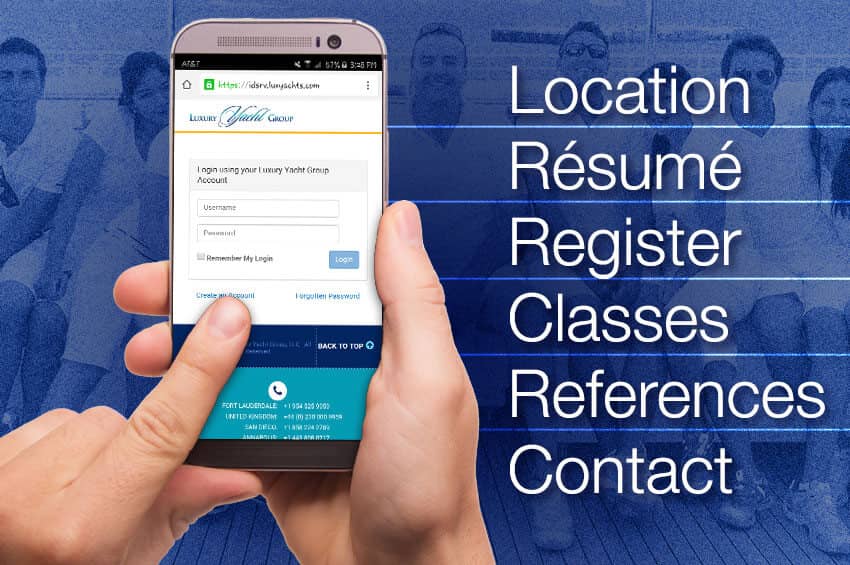
Yachts do hire people with no experience in yachting. The entry-level positions which offer new crew the best opportunity to learn the “ropes” in yachting are: junior deckhand, stewardess, steward, or cook. The key to finding your first position onboard is preparation.
There is a lot of competition for the rookie jobs on yachts. Begin your job search by identifying what skills you have that would be useful on a yacht. Assess your present skills and experience to focus on the characteristics that apply to the job you are targeting. Applicants with professional hospitality experience and training, at a hotel, resort, cruise ship, estate, or restaurant, are at an advantage in entering yachting. Holding specialty skills is also a means to enter the industry, such as masseuse, au pair, fishing guide, engineer, kite surfing instructor, pianist or helicopter pilot. You may just hold the skill that a captain needs to supplement his crew.
In all cases, stepping aboard will require a willingness to work hard and long as part of a team. An interest in learning and being flexible will increase your chances of finding a position that opens a new career path.
To get hired on a yacht with no experience you need to:
- Be in the right place at the right time
Have a professional resume
Register with luxury yacht group.
- Complete basic STCW classes
- Build references with day work
- Maintain contact 24/7
Be in the right place
There are seasons in the yachting industry. You will have the greatest opportunity without experience if you are in the location of highest demand and that changes throughout the season. The European season is May through September, centered in Antibes, France. The Americas/Caribbean generally place out of Fort Lauderdale early winter and early spring. In-person interviews are vital to success in finding a first opportunity. Arrange for flexible accommodations and have adequate living expenses to support yourself through a potential two month job search. Many first time yacht crew receive an immediate offer based on being in the right place at the right time, and could say “yes” on a moment’s notice.
Prepare a CV that portrays you as an energetic team player. Take care with the details. The resume is your best marketing tool. Typos and grammatical errors are red flags for a crew agency. Include a good photo as it is the industry standard. Smile and look the part. Use the Luxury Yacht Group web site for guidance on the basic skill sets for entry level positions. Be diligent in defining experience and highlighting transferable skills. Education, previous job experience, training or knowledge specific to the industry will get your CV a second look. List your most recent experience first. Hobbies and volunteer work can also illustrate character and work ethic. Diving, water sports, fishing, woodworking are hobbies which enhance your fit on a yacht. Provide professional references who have given you permission to use them as a contact. Captains look for an intersection of experience, certifications and personality in making hiring decisions. Give yourself an edge with a bit of personal detail – playing a musical instrument, proficiency in languages, flower arranging – to add dimension to your personality on paper.
Register with Luxury Yacht Group. A large agency with high placement volume offers the most opportunity to identify options for inexperienced crew. Be prepared to interview. Understand the requirements of entry level positions and how to explain the relevance of your experiences. Share stories which illustrate your work ethic, ability to solve problems and work in a team. Be on time and make a professional appearance. Some entry level positions have few specific requirements, but a captain will define specific preferences in a candidate. During an interview offer detail, enthusiasm and discretion when sharing experiences to display your ability to do routine tasks aboard, multi task, and be part of a team. Keep in touch with the agency regularly by logging into the website and confirming interest in any jobs that look good to you. Update your CV as you pick up day work experience, establish local references and complete any coursework you can locally while looking for work.
Complete basic licensing
Basic STCW is a minimum requirement to work on yachts that charter. The course has four parts and takes a week to complete. The modules which make up the Basic STCW certification are: 1) fire prevention and firefighting, 2) personal survival techniques, 3) personal safety and social responsibility, 4) first aid/CPR. Once the certificate is earned, it is valid for five years. Some modules do not expire. Check with your maritime school for details.
Establish references
During the search for a first job aboard, do day work. It is an excellent means to learn your way around a yacht. It is also a way to understand the physical demands and working style of yachts. Day work also provides you with local and yacht specific references. Be flexible on what you are willing to do – cleaning, polishing, detailing, laundry, wash-downs, painting. A seasonal or temporary job – even aboard a delivery without guests aboard – is a first step to a new career in yachting. Captains distinguish between applicants who want to enter a career and those who are looking to fill a summer. Educate yourself on the career path of the entry job so you can convey a commitment to yachting. (Immigration warning…many countries prohibit non-resident tourists from performing temporary “day work” when in their country. For example: a UK citizen admitted to the USA on a tourism ESTA cannot legally seek day work while in the USA.)
Maintain contact
Once a position of interest has been identified you must be available! Answer your phone and respond to emails immediately. Many entry positions are offered to the candidate who is ready to travel. Plans to attend a wedding in a month’s time….drop them. Partying Saturday night with friends….forget it, if the job offer comes in, you jump and get onboard immediately! One of the main reasons yachts pay well is that they expect a very high level of commitment.
Marianne and Gerard are examples of crew hopefuls with no yachting experience. Putting yourself in the shoes of a crew agent or captain, would you consider either of them for a rookie position aboard?
Marianne developed a love of the water fishing with her gramps. He taught her how to trailer his small boat, to steer, anchor and cleat. She described how much fun they had washing down the boat after a day on the lake and spending the winter sanding and painting. While in college she became such a yoga enthusiast that she taught the entire family where she worked, as an au pair, a morning yoga routine.
Marianne has the basics of a junior deckhand. Maintenance is a significant part of the responsibility on deck. She also displays some experience to apply to tender driving. Since she has worked with children, there is an indication that she has the skills to interface with owner families and guests. Her enthusiasm for sharing yoga may be the extra she brings to share with guests. An interview will assess whether Marianne will adapt to the pace and demands of a large vessel and how she will adjust to a team effort.
Gerard was raised in a family who owned a small hotel in a mountain village which served two tourist seasons – winter ski buffs and summer hikers. He explained that he and his siblings pitched in at whatever needed to be done to keep the hotel guests happy and returning each year – serving meals, making beds, loading cars. When he left home to backpack the world, he earned cash along the way by bartending. He has created a favorite cocktail recipe and named it after his hometown.
Gerard lived within the hospitality industry. It appears that his parents instilled a client driven attitude from a young age. As a junior steward, he would be doing many of the same things he did at the hotel as a child. An interview can verify whether Gerard has the “white glove” service standard, understands the need for discretion, and that he would be interested in working within the ‘interior’. Captains will also want to clarify whether Gerard is interested in a yachting career or if he is just adding the experience to his backpacking adventure.
The yachting industry is not a career for everyone. Rookies will find that work on a yacht is demanding, but offers great rewards. Finding a position on a yacht with no experience requires being prepared, having a detailed plan, and maintaining a positive attitude. Follow the steps outlined to increase your chances of coming aboard!

Engineering License Changes
The MCA has restructured the engineering certifications. The MEOL course has been done away with, and the AEC course made mandatory and more thorough. Luxury Yacht Group explains all these changes, what engineers progressing through the ranks can do now, and how Y ticket holders can convert their licenses over to the structure.
14 Mar 2018

A Day in the Life Series – Chief Stewardess
For a yacht to run smoothly, it requires many working parts, and the interior department is a large component of this. The chief stewardess oversees this department and makes sure all the stewardesses onboard know what their tasks and responsibilities are. The interior department is largely in charge of the guest services whilst they are onboard, and responsible for interior maintenance of the yacht when they are not.
18 Dec 2017
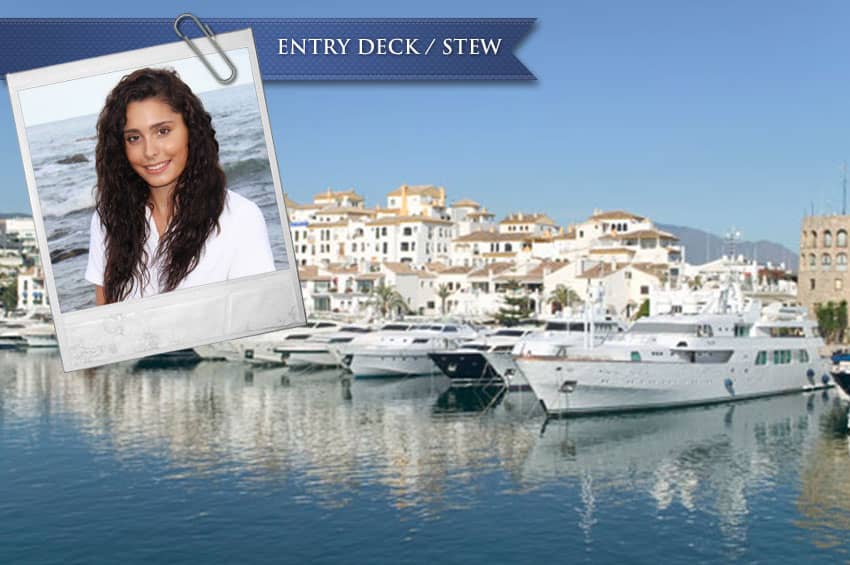
A Day in the Life Of Series - Entry Stewardess
Joining the yachting industry is an exciting and daunting undertaking. In this two part interview we speak with Melanie about why she decided to join the superyacht industry, what her hopes and goals are, and what she has learnt so far as an entry level stewardess.
29 Nov 2017
How to Find a Yacht Job with No Experience
Learn how to land a yacht job with no experience. From STCW certification to crafting the perfect resume, this guide covers essential steps for aspiring yacht crew.
The thought of spending days and nights on a luxury yacht is enticing to anyone. Even more enticing is the idea that you could get paid to spend time on a yacht, even if it means you’ll have to work hard. With more online exposure than ever, countless people have become fascinated with the idea of working on a yacht. Even still, many people struggle with how to find a yacht job without experience.
You can find a yacht job without experience if you get a Seafarers Medical Certificate and STCW certificate. This requires you to take a basic examination and 5 courses that highlight fire safety, security awareness, survival techniques, and first aid. Create a comprehensive resume that includes basic skills like communication as well as your past work experience.
Make sure to express your willingness to take instruction and learn as much as possible about the trade. Nobody expects you to know everything if you haven’t worked on a yacht before, so they will be patient if you work hard. Follow along as we explore how to find a yacht job without experience.
How Do You Get a Job on a Yacht With No Experience?
Getting a yacht job without experience may seem impossible, but it’s easier than you may think. Whether it be networking or signing up for basic training courses, there are several easy steps you can take to find a yacht job without experience.
1. Make Sure You Qualify
You can only get a job on a yacht without experience if you meet the qualifications. This includes an ENG1 medical exam and an STCW certificate. STCW certificates show that you have a basic understanding of fire safety and survival skills.
The ENG1 medical exam is important because everyone who works on a yacht must have a Seafarers Medical Certificate. You can only get your certificate if you visit an approved doctor for a basic medical examination. Once you Seafarers Medical Certificate, you must go back to the doctor every two years for another examination to make sure you still qualify .
2. Create a Resume

A resume is necessary to find a yacht job even if your past work experience has nothing to do with yachts. The personal paragraph is one of the most important parts of a resume for a yacht job. Make sure to keep it short and sweet while highlighting why you want to work on a yacht.
It’s important to highlight what you bring to the table and make it clear that you are willing to learn. The rest of your resume should consist of your education and past employment history. Yacht jobs are often varied and require several skills, so it helps if your past work experience entails several different skills .
Include your Seafarers Medical Certificate and STCW certificate in your resume. If your resume is striking enough, you will hopefully get an in-person interview!
3. Join Luxury Yacht Group

Luxury Yacht Group is a great resource for anyone trying to find a yacht job without experience. This agency helps thousands of people find crew work on yachts throughout the world each year. Not only do they help crew members find jobs, but they also help people that own and charter yachts find crew members .
That makes Luxury Yacht Group invaluable for prospective crew members as the service has countless contacts. You simply set up an account, provide your availability, and search for job postings. Crew members with varying experience levels use Luxury Yacht Group, and it’s perfect for beginners and seasoned workers alike.
4. Complete STCW Training
You may not need past yacht experience to get a job, but you must have completed basic training. Standards of Training and Certification of Watchkeepers (STCW) training is necessary to find a yacht job. The International Maritime Organisation regulates boating and shipping throughout the world.
They strictly require shipping and yacht personnel to undergo STCW training. The training includes fire prevention, fire fighting, first aid, security awareness, and survival techniques . Each of these categories is essential to keep everyone safe on a yacht in case the vessel takes on water or someone gets injured.
It only takes 5 days to complete STCW training, and it’s worth the time if you want a yacht job. You can take each course individually, but I recommend taking them all together so you can get your certificate in 5 days. You can register for STCW training online. Once certified, you must redo your fire safety and sea survival courses every 5 years.
5. Book an Interview
Working on yachts has a lot to do with your charisma and communication skills. That’s why it’s important to make a great first impression when you book an interview for a yacht job. Yacht jobs are similar to many service industry jobs in that you must be polite, concise, and forward with people.
This should all come across in your interview so your potential employer sees how you would be perfect for the job. Bring your resume and certifications so they know you’re prepared and responsible . Whether you get hired or not, make sure to leave a memorable impression because they may be able to hire you in the future.
6. Be Open to Training
Some training will be necessary if you find a yacht job without experience. This is true even if you have your STCW certificate. Luckily, many captains are understanding and realize there is a learning curve for working on a yacht.
Be open to training and try your best to learn on the job. On-the-job training is more useful than taking courses, but only if you listen well and collaborate with the other crew members . The hands-on experience you get will help you learn much more quickly than any training course, even if it can be overwhelming at first.
7. Meet New People
The phrase “it’s who you know, not what you know” is accurate in the world of yacht jobs. Of course, you must have a practical and hands-on understanding of the job, but you’ll get more work if you network with others. You will likely work with several crews on different yachts throughout the season or year.
Connect with your coworkers to get tips about jobs and resources you can use to stay busy. It also helps to spend time at local marinas to declare your availability and find new job leads . Sure, online resources are useful, but I find that mingling with other people and speaking in person makes it much easier to find work.
8. Keep Your Schedule Open
Keep your schedule open when you’re trying to find a yacht job. Yacht jobs often come in without much notice, so it’s a good idea to keep as much space open in your schedule as possible . You will get the most yachting jobs in summer and winter, so avoid scheduling too many plans during that time.
Sure, you may miss out on some social events, but it’ll be worth it when you quickly build an impressive yacht job resume. You may get calls when other crew members cancel on a job or if someone charters a yacht last minute without any notice. People will continue to offer you jobs if you regularly say yes even at a moment’s notice.
9. Regularly Update Your Resume
Update your yachting resume after each job. Make sure to include contact information for former employers and captains to give yourself more legitimacy . You will need to apply for new yachting jobs after each gig, so it’s important to constantly update your resume so it’s as impressive as possible.
It’s especially important to update your resume if you get new certifications. For example, some people may start as stewards and eventually study a trade, such as electrical work. Once you get a degree or certification in a specialty, you must add it to your resume.
This can open the door to new job openings that pay better.
10. Honor the Hierarchy

Like any workplace, yachts have a hierarchy amongst the crew. Familiarize yourself with the hierarchy of a yacht crew before your first job. The captain is the highest-ranking position, followed by the first mate, lead deckhand, deckhand, chief engineer, and second and third engineers .
Stewards and stewardesses are the basic entry-level yacht jobs. As a steward, it’s important to honor the hierarchy, make a great impression, and see how the other positions work. From there, you can decide if you’d like to pursue another position.
For example, you may work several jobs in the galley and on the deck as a steward and realize you want to pursue an electrician job . Find an appropriate time to speak with the onboard electricians and see what steps you need to take to pursue that position. The same can be said for any yachting job, and as long as you show respect, you can work your way into any job title.
What Skills Should I Put on My Yacht CV?
Your yacht CV (Curriculum vitae) should include everything from basic skills like communication to special skills like navigation. The resume should reflect your skill set. For example, make sure to include any past electrical work and certification if you’re looking for an electrician or engineering job .
Conversely, stewards must include past service industry jobs and experience to appeal to employers. Yacht chefs must have past food service and chef experience. Write your resume to reflect your past work experience and the job title you are looking to get.
What Is The Easiest Job on a Yacht?
No yacht job is easy, but it’s easier to get steward jobs because they don’t typically require specialized skills. Stewards and stewardesses serve food and drinks to guests throughout the trip. This requires lots of attention and communication skills, and while it’s not easy, it’s easier than being a yacht engineer or electrician.
How Much Do Yacht Stewardesses Make a Month?
Yacht stewards and stewardesses can make up to $5,000 per month. It ultimately depends on your daily or weekly rate. Yacht jobs typically carry daily rates, but you are sometimes paid by the hour.
One of the biggest appeals to yacht workers is that you can make a fortune with tips. A yacht’s crew receives 5%-15% of the charter price in tips in many cases, and that makes up a big portion of a stewardess’ monthly pay . Once you become a chief stewardess, you can make up to $90,000-$100,000 each year.
So, How Do You Get a Yacht Job Without Experience?
The best way to get a yacht job without experience is to get an STCW certificate and take an ENG1 medical exam. Once you have these certificates, you can include them in your resume. Use online resources like Luxury Yacht Group to get yacht jobs, and network with people at local marinas. Make sure to get a medical exam every 2 years and retake your fire and sea survival courses every 5 years to keep getting yacht jobs.
Kit Evans is a seasoned marine journalist and naval architect, bringing over 20 years of multifaceted experience in the boating industry to his writing and consultancy work. With expertise ranging from boat design and marine surveying to charter operations and vessel restoration, Kit offers unparalleled insights into all aspects of maritime life. When he's not penning articles for top boating publications or hosting his popular YouTube channel, Kit can be found sailing his lovingly restored 1960s Columbia 29 on the Chesapeake Bay, embodying his commitment to both preserving nautical heritage and embracing modern innovations in boating.
Recommended Reads
Trending reads.

15 Best Lobster Boat Tours in Maine
Explore the top 15 lobster boat tours in Maine for an unforgettable experience. Learn to catch lobster, enjoy marine life sights, and more. Ideal for travelers!

How Much Does Freedom Boat Club Cost?
Explore Freedom Boat Club costs state by state! Learn about membership fees, benefits, and why it's a budget-friendly option for boating enthusiasts.

20 Best Liveaboard Marinas in North Carolina
Explore the top 20 liveaboard marinas in North Carolina, perfect for travelers seeking a unique on-water living experience with all amenities included.
Your trusted source for travel guides, tips, and insights since 2020. Empowering adventurers with expert advice for smarter, more rewarding journeys.
- Yotspot Connect
- Advertise with us
Extra Reading
- Success Stories
- Mental Health
- Seafarer Employment Agreements
- How to get into Yachting 'The Handbook'
Our Partners
- Join the PYA
- Financial Services
- Yacht Brokerage
- Find an ENG1 Doctor
Need Help? Contact our support team
- X / Twitter

Join Yotspot
Advertise your maritime positions with Yotspot, the leading jobs board in the yachting industry. Connect with top candidates for super yacht and shore-based roles. Kickstart your career with Yotspot's extensive job listings, career training, and industry connections to help you chart your professional path.
The Yacht Account
Are you looking for professional yacht crew? Join and gain unrestricted access to our entire crew database with unlimited postings for Captains, Deckhands Stewardesses and much more...
Sign up free Find out more
The Shorebased Account
Are you looking for yachting industry professionals? Join and gain unrestricted access to our entire database of industry professionals with unlimited postings for Yacht Brokers, Managers, Designers and much more...
The Jobseeker Account
Are you looking for jobs or opportunties within the yachting industry? Join and access advanced features to assist your job-hunting journey as well as exclusive discounts, deals and benefits...
The Training Account
Are you a maritime training provider looking to advertise your course? Join and advertise your maritime training courses including dates & availability to maritime professionals who need them...
How to get a job on a superyacht without any experience?

Check out Yotspot’s 5 Step Plan.
We’ve all got to start somewhere. Superyachts do take on people with no prior experience, you’ve just got to be willing to work hard, work long hours, keep smiling, be polite and agree to take on an entry-level job, so you can learn on the job. Positions like; stewardess, steward, cook or junior deckhand. All jobs currently listed on our Yotspot jobs board today.
It’s an incredibly popular industry to work in, especially for ambitious individuals; flexible enough to travel, keen to gain experience and eager to see the world.
So, let’s get started…
- Hop on the Yotspot jobs page, walk the docks or visit local agents
- Polish and perfect your CV/resume (the Yotspot team are on hand to help if you need it)
- Sign up FREE as a Yotspot member
- Complete your basic STCW
- Build a bank of references with day work
- Search for positions through us:
- Superyachts (motor and sail)
- Sailing Yachts
- Commercial Vessels
- Research Vessels
- Yacht Build and Refits
- Yacht Management
- Yacht Sales, Charter, Brokerage and more…
Step 1 – what transferable skills have you got?
Jot down your skills and experience that complement the job you’re applying for. Think about what might be useful on board the yacht. Experience and training in the hospitality industry EG: cruise ship, restaurant, hotel, private household or resort is definitely a bonus. Plus, if you’ve got specialist skills or training; engineer, yoga instructor, nanny, masseuse or helicopter pilot you’ll be an even more valuable recruit to the captain and his crew.
Step 2 – a “can do” attitude to learning
The captain will be looking for an eagerness to work hard and a “team player” – someone who fits in well with the existing crew, someone flexible, willing to go the extra mile and interested in self-improvement.
Step 3 – Be ready for work at a moment’s notice
The world of yachting follows a seasonal pattern, so it pays to base yourself nearby if you can.
The European circuit runs from May to September, mainly in Antibes, South of France, and the Americas/Caribbean from early winter and early spring, mostly out of Fort Lauderdale.
Being available for day work, shadowing crew, helping out, getting whatever experience you can, hanging around bars where crew hang out, networking, visiting local agents and being available to attend in-person interviews will help.
While you are job hunting, keep your living arrangements as flexible as possible, so you can say “yes” to work at a moment’s notice. It may take time though, so make sure you’ve got enough money to support yourself for a couple of months.
Step 4 – Make sure your CV is top notch
This is your first impression so make sure it’s a good one! Include a good, clear photo – check out our tips for getting your profile photo right ! Get someone to check your CV for typos and grammatical errors – mistakes look sloppy! Again, our friendly team are on hand to help.
Make sure you include relevant experience, with the most recent first and those valuable transferable skills. Education, prior job experience, training and any industry knowledge will make your CV stand out. Potential employers like to see hobbies, interests and additional skills, like flower arranging, proficient languages etc. Anything that makes you stand out as a candidate and gives you that additional edge. References are really important, make sure you ask previous employers if they’d mind being your referee.
Step 5 – Complete your basic training
Mandatory training, and the minimum requirement, for anyone working on yachts that charter is the basic STCW – Standards of Training, Certification and Watchkeeping.
The STCW takes about a week to complete and comprises four modules:
1) fire prevention and firefighting
2) personal survival techniques
3) personal safety and social responsibility
4) first aid/CPR.
Once completed, you’re awarded a certification which is valid for five years. Although some modules don’t expire – check with your maritime school.
Working in the yachting industry requires a strong work ethic, stamina and a positive mental attitude. And if you’re willing to put in the effort, the rewards can be amazing.
If you haven’t already, register with Yotspot today and select from hundreds of jobs with yachts, agencies and management companies with one click, one profile and from one central location. Your ideal job could be there waiting for you!
- Charleston Accommodations
- Charleston Bachelorette Party
- Charleston SC Nightlife & Bars
- Charleston SC Restaurants
- Charleston SC Things To Do
- Folly Beach SC
- BACHELORETTE PARTY PLANNING
- WORK ON A YACHT
- MUSIC FESTIVALS
- TRAVEL GEAR & PACKING CHECKLISTS
- CONNECT W/BAKER MANNING
- SHOP MY FAVORITE GEAR

Folly Beach South Carolina United States: Your Coastal Paradise Awaits

Firefly Distillery: An Authentic Lowcountry Experience

Charleston Breweries: A Fun Bachelorette Party Activity

The Ultimate Guide to Finding the Perfect Charleston SC Airbnb

15 Things I Hate About Charleston Life… Travelers Beware!

Slay Your 2024 Charleston SC Bachelorette Party

The Best Things To Do in Charleston South Carolina in 2022

8 Crucial Things to Know About Nightlife in Charleston SC

51 Unique Things To Do in Charleston That Don’t Suck…

4 Entry Level Yacht Jobs For Beginners
In this post we're going to learn about the 4 entry level yacht jobs that are options for new yacht crew who have no prior experience working on a boat. We will also go over the following topics:
- The 15 crucial qualities that every yachtie must possess
- Stew/Deck/Cook
THE YACHT JOB HANDBOOK + ONLINE COURSE
2020 holiday flash sale .
TO GET 50% OFF USE COUPON CODE: HALFOFF2020
The Yacht Job Handbook & Online Course
In The Yacht Job Handbook , I'll walk you through the entire process of getting a job on a yacht. I’m going to break down this process into a step-by-step formula that will serve as a roadmap to help fast-track your career so that you can start getting paid to live, work, and travel the world on a luxurious yacht.
4 ENTRY LEVEL YACHT JOBS FOR NEW YACHT CREW
There are all types of different tasks that need to be performed around the clock to maintain a yacht and keep it running smoothly. While some of the job positions onboard are very technical and require a lot of skill and knowledge, there are 4 entry-level jobs that require little to no prior experience. The most common entry-level jobs on a yacht are some variation of:
1. Yacht Stewardess / Steward
2. deckhand yacht jobs, 3. cook / chef yacht jobs, 4. stew / deck / cook yacht jobs.
15 CRUCIAL QUALITIES THAT EVERY YACHTIE MUST POSSESS
While prior experience isn’t necessary to perform the duties of an entry-level crew member, there are a few abilities and qualities that every member of a yacht crew must be able to demonstrate if they want to succeed. Whether you’re a greenhorn or a seasoned vet (while you’re working) you must be:
- Professional
- Presentable
- Resourceful
- Composed Under Pressure
- Able to Maintain Discretion
- Able to Maintain Safety
- Able to Aid in Emergencies
- Able to Follow Orders
- Able to Prioritize Tasks
- Able to Learn and Act Quickly
Tips and Tricks
- Always keep an open mind and try new things - you may think you are meant to be a stewardess and find that working on deck suits you more, or vice versa.
- Don’t get too intimidated when looking at the skills and duties listed below. While these are skills you will be expected to learn and cultivate eventually, (the quicker the better,) you don’t necessarily have to have prior experience when you’re just starting out.
- Teamwork makes the dream work. As a member of the crew you’re part of a team, so you should expect to help out anyone and everyone on board if necessary, even if it’s not technically a normal part of your job or department.
SUPER YACHT CREW JOBS
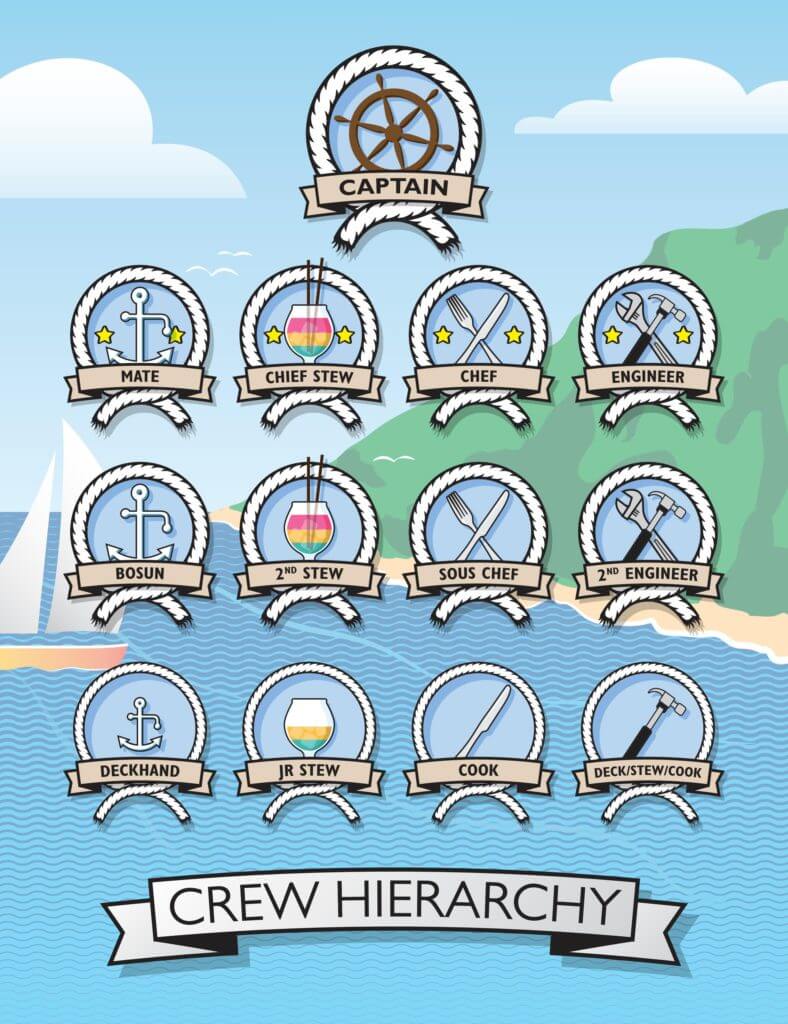
You may have a very impressive resume back on land, but college degrees and PHD’s will not go far on the 7 seas! If you’re serious about pursuing a job on a yacht- you will have to work your way up the ranks one step at a time. Whether you want to start a new career, or just try it out for a year, you’re going to have to start….
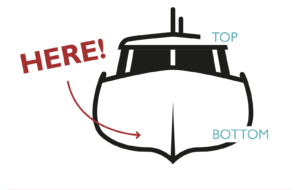
YACHT JOB DESCRIPTIONS
You’ve gotta get in where you fit in!
Let’s take a closer look at each of these positions so that you can decide for yourself: which crew are you!? Below we will go over the general overview of each position. If you would like to learn more about what type of personal skills are necessary to perform the typical day to day duties.
Stewardess/Steward:
- As a stewardess your domain is going to be the interior of the boat, meaning a majority of your time will be spent inside .
- You will be responsible for the upkeep, appearance, and cleanliness of everything , and you will be expected to do so with an an extremely strong attention to detail. A guest should never have to be burdened with the site of one single finger print or speck of dirt on any surface!
- Guest Service
- Hospitality
- Housekeeping
- This position is more commonly held by females, although not always.
- Many boats are now combining the roles of a stewardess with those of a deckhand or even a cook.
- This job is great for high energy, resourceful, and well-organized individuals. You will be expected to work around the clock , ensuring that the guests’ needs are met. The word “no” is no longer a part of your vocabulary. Their wish is your command!
Useful Skills for a Yacht Stewardess
The following are skills that are useful or necessary to perform the duties of a stewardess:
- Silver Service
- Guest Hospitality
- Event Planning
- Table Setting
- Napkin Folding
- Strong Attention to Detail
- International Etiquette
- Child Care / Nannying
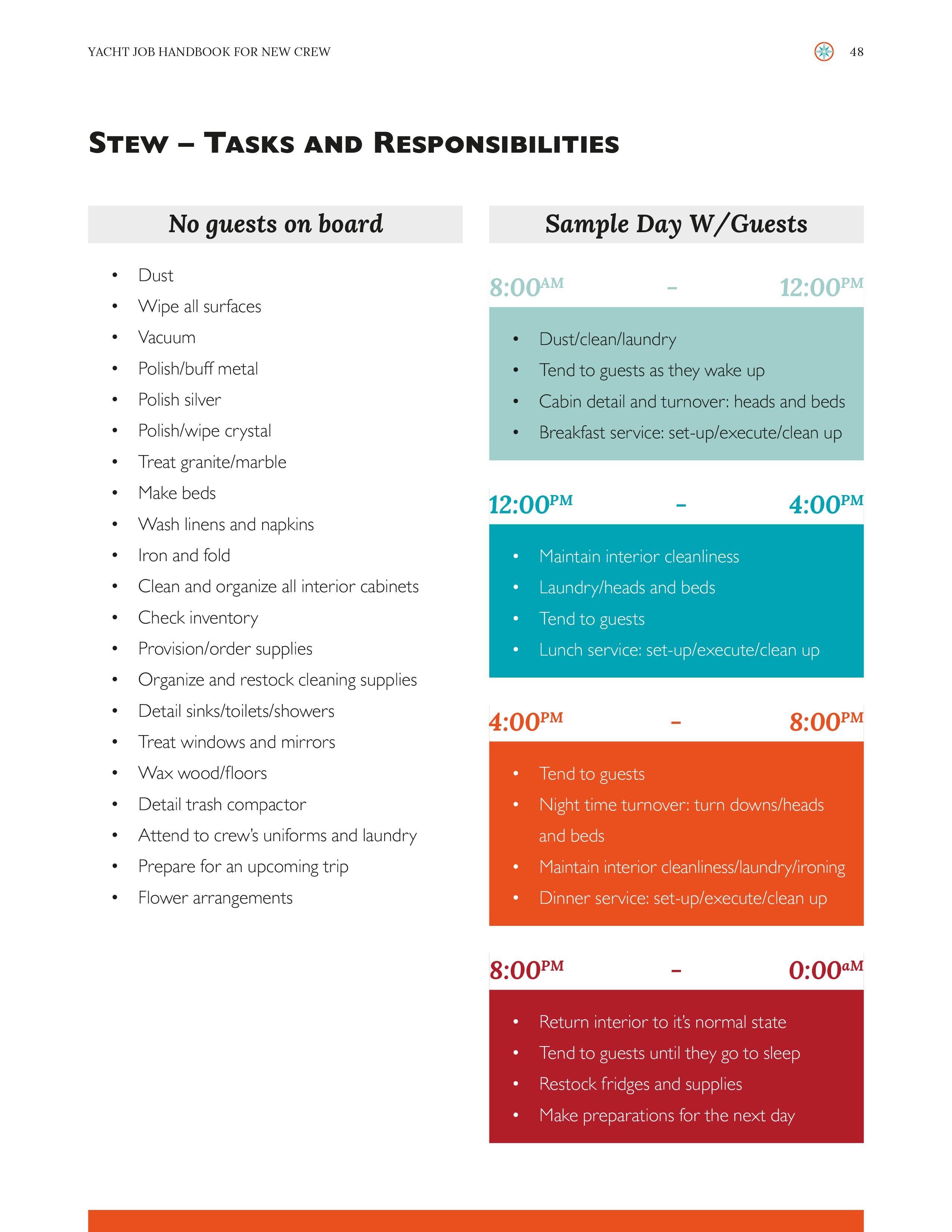
- As a deckhand you are responsible for the exterior of the boat, and a majority of your time will be spent outside . Keep this in mind if you can’t handle the sun beating down on you all day !
- You basically have to make sure the exterior of the boat looks brand new at all times, which can be a LOT of work, and let’s just say- manual labor .
- You also have a lot to do with preparations for leaving and arriving to port, as well as any of the watersports or other outside toys that come along with the boat such as jet skis, paddle boards, inflatable floats / slides, etc.
- You must monitor and maintain the safety of the guests and crew at all times.
- When guests are on board you will help prepare and execute any outdoor excursions such as snorkeling, fishing diving, surfing, beach picnics, etc. (and sometimes you may even get to participate.)
- A majority of deckhands are male, but there is a fast growing number of female deckhands or deck/stews in the industry. I was a deck/stew on my first boat and highly recommend it!
- This is a great job for a strong, adventurous, outdoorsy person who is able to spend long hours outside in the sun, and doesn’t mind getting wet, sweaty, salty, and sandy on a regular basis. Physical strength and stamina are 100 % necessary.
Useful Skills for a Deckhand on a Yacht
The following are skills that are useful or necessary to perform the duties of a deckhand on a yacht:
- Cleaning / Washing
- Waxing / Polishing
- Boat Driving
- Line Handling
- Tying Knots
- Securing / Stowing / Covering Furniture
- Woodwork / Varnishing
- Construction
- Watersports / Fishing
- Mechanics / Engineering
- Physical Strength / Stamina
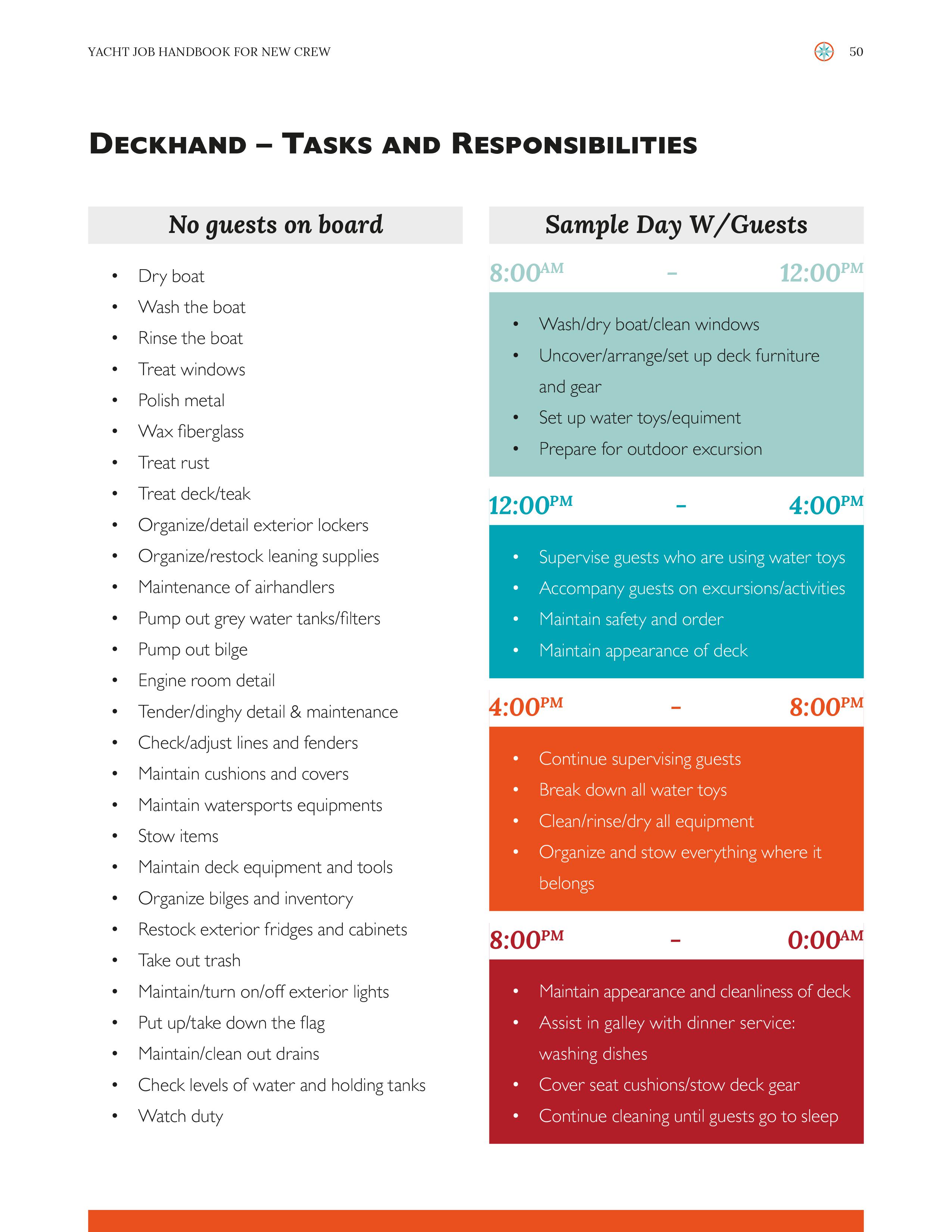
MAKE THIS DREAM JOB YOUR REALITY!
Thanks for subscribing! Please check your email for further instructions.
Yacht Chef / Cook
- As a chef your domain is the galley (the kitchen of a boat) and nothing else. You may spend 16 + hours in the galley all day if that is what the job entails. Many people would agree that on many boats- this is the most tedious position of all.
- While most chefs are very experienced, some smaller boats will hire on less experienced “cooks” or even just people who claim they can cook, and often times that role may be combined with a stewardess or deckhand position.
- As a chef aboard a superyacht you are expected to concoct culinary masterpieces for every single meal that the guests eat on board. You must be knowledgeable, versatile , and creative and it is advised that you really have a passion for preparing food because you will be doing it around the clock!
Useful Skills for a Yacht Chef
The following are skills that are useful or necessary to perform the duties of a yacht chef:
- Strong Culinary Background, Education, and Skills
- Extensive Experience in a Professional Kitchen
- Meal Planning / Preparation
- Food / Wine Pairing
- Gourmet Food Presentation
- Time and Space Management
- Food Prep / Handling
- Table Settings
- Provisioning
- Adaptability / Flexibility
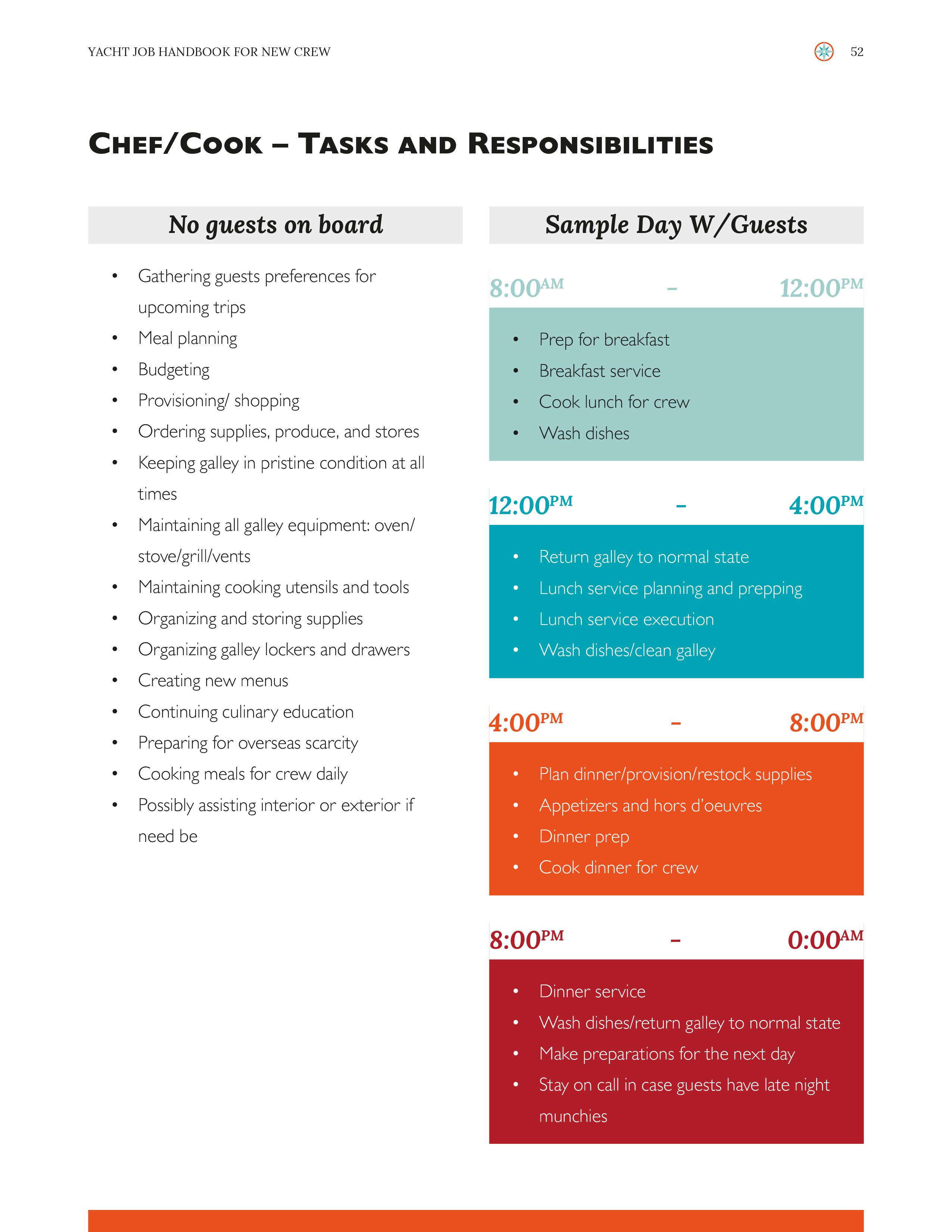
Stew / Deck / Cook
- As I mentioned above, many boats combine the roles of a deckhand, stewardess , or cook into a hybrid position in which you basically carry out a variety of tasks that depend upon what is the most urgent, or which of the work detail circumstances (listed below) the boat is in.
- In this case you just bounce around to where you are needed most and serve as an assistant to the rest of the crew. It is a great opportunity to learn the foundations of all of the positions on board and eventually decide which position you truly enjoy the most if /when the day comes that you have to choose one.
- There is really no end to the different variations of tasks you will have to perform in one of these combined / hybrid positions.
- My advice to you if you get a job offer for one of the “joint positions above” is to make sure that it is clear of what is expected of you before you accept the job.
- Sometimes (not too often) new crew get taken advantage of by accepting a position (with low pay!) and ending up having to perform way more duties than what is fair or even humanly possible.
- On the other hand- I highly recommend a joint position as long as you know what you’re getting yourself into and everything seems fair.
"THE WAKE OF BAKE"
ENTER TO WIN!
Subscribe to my YouTube channel and you will automatically be entered to win a free digital download of The Yacht Job Handbook. A new winner is chosen every Friday.
Follow us on Instagram @bakermanning87
- LET’S CONNECT
Is a Yacht Stewardess Salary Higher Than Yours?
14 tasks you must complete before you can work on a yacht, 10 ways working on a yacht will change your life, yacht stewardess and deckhand jobs and contracts.

Yacht Crew Agency / How to Find A Yacht Job with no experience?
How to Find A Yacht Job with no experience?
- April 23, 2023
Embarking on a career in the yachting industry can be exciting, rewarding, and challenging all at once. With so many opportunities available, you may be wondering how to find a yacht job with no experience. Fear not! In this comprehensive guide, we’ll walk you through the essential steps to kickstart your yachting career, even if you’re starting from scratch.

Getting Started
Research the industry.
Before diving headfirst into the yachting world, it’s crucial to have a solid understanding of the industry. Familiarize yourself with different yacht types, sizes, and roles on board. Research various career paths, and discover what it takes to succeed in this competitive environment.
Determine Your Role
There are numerous roles available on a yacht, such as deckhands, stewardesses, chefs, and engineers. Assess your skills, interests, and previous experiences to determine which role aligns with your strengths and passions.
Acquire Necessary Skills
With a target role in mind, identify the skills needed for that position and work on developing them. For example, if you aim to be a deckhand , learn basic knot tying, and navigation. If you’re pursuing a role as a stewardess , focus on hospitality, housekeeping, and customer service skills.
Build Your Network
Networking plays a crucial role in the yachting industry. Attend boat shows, yachting events, and seminars to connect with professionals and potential employers. Join online forums and social media groups dedicated to yachting to expand your network even further.
The Application Process
Prepare your cv.
Craft a professional and well-organized CV tailored to the yachting industry. Highlight your transferable skills, relevant experiences, and any certifications or training courses you’ve completed. Ensure your CV is visually appealing and easy to read.
Write a Cover Letter
A strong cover letter is essential for standing out among other applicants. Showcase your enthusiasm for the industry, explain why you’re a great fit for the role, and express your willingness to learn and grow within the position.
Search for Job Openings
Keep an eye on yachting job boards, social media groups, and company websites for job openings such as Yacht Crew Agency . Stay proactive in your search and be ready to apply as soon as you spot an opportunity.
Apply to Recruitment Agencies
Register with yacht crew recruitment agencies to increase your chances of finding a job. They often have access to exclusive job openings and can connect you with potential employers. Be sure to maintain a strong relationship with your recruitment agent and update them on your progress.
The Interview Process
Prepare for the interview.
Once you’ve landed an interview, take the time to research the yacht, its owner, and the company behind it. Prepare answers to common interview questions and practice your responses to convey confidence and competence.
Ace the Interview
During the interview , be professional, punctual, and attentive. Dress appropriately, maintain eye contact, and listen carefully to the interviewer’s questions. Showcase your passion for the industry and your willingness to learn and adapt to the role.
Onboard Training
Complete safety courses.
Before starting your yacht job , it’s essential to complete safety training courses. Courses such as STCW (Standards of Training, Certification, and Watchkeeping) and ENG1 (a medical fitness certificate) are often required for most yacht crew positions.
Obtain Required Certifications
Depending on your chosen role, you may need to acquire additional certifications. For example, deckhands may need a Powerboat Level 2 certificate, while chefs may require a Food Safety and Hygiene certificate.
Working on a Yacht
Adjusting to yacht life.
Life on a yacht can be demanding and require long hours, but it can also be incredibly rewarding. Be prepared to adapt to the unique challenges of living and working on a yacht, such as limited personal space and strict hierarchy.
Embrace Continuous Learning
The yachting industry is constantly evolving, and it’s vital to keep learning and growing. Attend workshops, complete additional training courses, and seek advice from experienced crew members to enhance your skills and advance your career.
Common Questions
Yes, it’s possible to find a yacht job with no experience, but you’ll need to be proactive, acquire relevant skills, and network with industry professionals to increase your chances of success.
Common entry-level positions include deckhand, junior stewardess, and junior chef roles. These positions offer an opportunity to gain experience and develop your skills within the yachting industry.
Yes, most yacht crew positions require STCW and ENG1 certifications. Additionally, specific roles may require further certifications, such as Powerboat Level 2 for deckhands or Food Safety and Hygiene for chefs.
You can attend boat shows, yachting events, and seminars, as well as join online forums and social media groups dedicated to the industry.
Your CV should be tailored to the yachting industry and highlight your transferable skills, relevant experiences, certifications, and any training courses you’ve completed.
Social Chat is free, download and try it now here!

Keep up to date with Smart Move
How To Work On A Superyacht, With No Experience in 2020
Posted on: 06/23/2020

Article Written By Meg Tonkin of Get Onboard Superyacht Academy in Cape Town. June 22 2020
With over 12 years in the industry, interviewing and hiring countless candidates across various positions, we know first hand al the information you require in order get your first real crew job on a superyacht.
In this post we highlight some of the features of our "Beginners Guide to Yachting" Ebook which explains all you need to know from how to get your CV yacht perfect, typical daily stewardess or deckhand duties, how to find day work and more.
What is an entry level position for my first job on a yacht? The two most common entry level positions on yachts are stewardess jobs and deckhand jobs. These are both junior ranks whose primary concern is to keep the guests happy and ensure the interior and exterior are kept immaculately clean.
You can also apply for specialist roles such as a superyacht engineer and chef jobs, however these may require some previous experience or qualification.
What qualifications do I need to work on a yacht? What are the basic elements you need to be eligible to work in the yachting industry: · STCW’10 · ENG 1 What is the STCW Course?
STCW stands for Standards of Training, Certification and Watchkeeping. The STCW'2010, previously referred to as STCW'95, is a compulsory requirement for any seafarer in order to be eligible for employment at sea. If you are planning on joining the Superyacht industry to look for a yacht job as a stewardess, deckhand, engineer or chef, you will need to complete this STCW course. This course covers personal survival techniques, fire safety and fighting, first aid, social responsibility and security awareness.
What is the ENG1 medical certificate?
The ENG1 Medical is a basic medical certificate and is as essential as your STCW'10. It is a mandatory requirement to prove you are fit to work as a yacht crew member at sea. Only MCA-approved doctors can perform an ENG 1 medical exam.
Where can you complete your training?
Get Onboard Superyacht Academy offers complete STCW and ENG1 training in Cape Town, South Africa.
With over 14 years industry experience, our maritime partners internationally accredited maritime partners who are ITY and MCA certified ,were carefully selected to ensure our candidates are provided the best possible training experience with top notch facilities in order to ensure they begin their super yachting career with a competitive edge. Read our article on how to choose a training school for more information.
Do I need any other courses?
While the STCW and ENG1 are the only compulsory courses that you need to complete in eligible to work at sea, there are various other courses you can complete that will greatly enhance your CV. These include deck modules like, Powerboat Level 2, Yacht Rating certificate, Jetski licence, Stewardess training which includes flower arranging, barista training, wine pairing and basic housekeeping skills.
What previous experience is useful when looking for a job on a yacht? While working on a yacht is certainly different to any land based career, there are various land based positions that offer you skills that will be beneficial to working on yachts. Any job that involves hospitality training, bartending, working as a server in a high end restaurant, beauty therapy, child care or au pairing, food safety, flower arranging are highly beneficial as well as carpentry, work sports instructor, dive master or anything else yacht related. If you have already completed some form or degree or diploma in engineering or mechanics, this is also considered a huge plus. Have a look at our article on other skills that can benefit you onboard for a more detailed explanation.
How do I get my first job on a yacht? Once you are qualified, what are the next steps to finding your first job onboard?
How do I make a Yacht CV?
Yacht CV's are very different to landbased CV's and are essential when looking for a job on a yacht. Read our guide on what Captains Look For in A CV for more information.
What is Daywork?
Day work is a great way of networking, building contacts in the industry, and most importantly finding you first superyacht job. Day work refers to when you do not have a formal contract in place with a yacht, but you help out onboard for anything from a day to several weeks. Day working is a great way for you to get a sense of different roles onboard and whether the industry is right for you. Often the Captain or senior crew member will use day work as a trial or "audition" to see who is the best fit for the crew and is the most efficient worker so it is an excellent tool to use when searching for your first job.
What are the best locations to get a yacht job?
There are two main yachting hubs, the Mediterranean, particularly Antibes in France or Palma de Mallorca in Spain, and Fort Lauderdale or Miami in Florida. We explain the different seasons and best time of year to visit each areas in our article Best Locations To Get a Yacht Job for Time of Year
How much money do you make working on a yacht? Yacht salaries will vary between position, depending on your experience and even from boat for boat. Entry level positions may pay similar to land-based industries, however there are certain additional benefits to yachting that will make the salary more attractive. Once you are employed onboard, you have very little living expenses as your food, basic toiletries, insurance and uniform are all covered by the yacht.
How much can a stewardess or deckhand earn?
The standard entry level salary for a junior stewardess or deckhand ranges between €2000-€2500 or $2300-$2800 per month. This amount is generally tax free, although the onus is on each crew member to check with their home county about tax obligations. Certain countries are tax exempt provided you spend more than 6 months out of the county.
What is it like working onboard a superyacht? While the yachting industry has many perks, it certainly isn't for everyone. Often you are required to spend long periods away from friends and family as well as working long hours living in a shared work environment. Take a look at our article to learn the truth about yacht crew life and see if working on a yacht is really for you.
Do you still have some unanswered questions? Why not download our eBook and find out all the insider tips of surviving, and preparing for yacht crew life, or contact the Get Onboard team. Please use discount coupn code at check-out " SMARTMOVE" for a special discount!
https://get-onboard.com/blogs/yacht-info/how-to-work-on-a-superyacht-with-no-experience
How to Find A Yacht Job Without Experience

This article may contain affiliate links, meaning I make a small commission on any purchases at no extra expense to you. Read our disclaimer & privacy policy here.
Thanks to my job as a yacht stewardess, I’ve been able to live in and explore some of the most beautiful and remote spots in the world. Some of those places can only be reached by water and only a small percentage of the population will ever get to see them. But, none of this comes easy. Working in the yacht industry takes hard work and dedication but comes with some massive payoffs.
If you're interested in other travel jobs in hospitality, look into becoming an overland tour guide . As a guide, you'll take groups of travelers across continents via land travel for months on end. Another option to travel by sea is to work on a cruise ship .


Requirements to Get Hired as a Yacht Stewardess
- STCW10 (Basic Safety Training)
- ENG1 Medical
- Hospitality Experience (Good to have but not necessarily a deal breaker)
I worked on the private islands in the Whitsundays Queensland Australia for over 4 years. I started out as personal trainer on the fitness club then cross trained into front office reservations, housekeeping, and food and beverage. I’ve also done hostess work on luxury boat transfers.
All of this accumulates to 11 years in the industry and a keen insight to what boats are looking for in their crew.
The job possibilities on a superyacht are diverse. Since a boat is it’s own independent entity, they need everyone from laundry to engineers, deck crew to yacht stewardesses, personal trainers to chefs and just about anything in between. Depending on the size of the yacht, you could be expected to balance many roles or do one specific thing each day. Generally, a bigger yacht will have the budget to hire more specialized crew, where a small yacht will be searching for a few jack of all trades.
Rather work in a hotel, resort or restaurant abroad? Learn how to best utilize LinkedIn to find hospitality jobs abroad!
In addition to the requirements, when I hire, I look for some specific qualities in candidates:
- You must be a hard worker
- No bullshit attitude and no drama
- Ready to take on tasks you may not want to be doing
- Be a good listener
- Have an incredible eye for detail
- Be respectful of others. Remember you all work, eat and play together day in and day out
- Be willing to be at sea and away from family and friends for weeks and maybe months at a time
- Be committed. No one likes a crew member who doesn't contribute 100%
- Bonus: Have experience in high-end hotel operations or hospitality
In interviews, you have every right to ask as many questions as you want. It doesn’t just have to be right for the employer but for you too! Don't be afraid.
We’re not a regular travel blog; we’re a collection of women living around the world, all with different backgrounds, jobs, desires, & nationalities. What do we have in common? A passion for life abroad. Each article is written from the 1st-hand perspective of a woman who has actually done or experienced what she writes about. Learn more about the author by clicking her bio pic at the start or end of each article.
Dream of moving abroad but need a helping hand? I got you. This e-book isn't a regular book, it's also a workbook geared to helping you make some big decisions regarding the life abroad you want to build. Everyone's way abroad is different. This book is all about helping you find yours.

Steps to get hired as a "Green Stew" on a mega yacht
To reduce the information overload, I’ll focus on yacht stewardess roles, specifically for newcomers to the industry.
Currently I’m a chief stewardess on a private mega yacht. Meaning I’m in charge of everything that happens in the realm of service and housekeeping. Working on a yacht also means living on a yacht so another part of my job is keeping my team energized and working well together throughout the season.
Everyone who is new in the industry is known as a “green stew.” Most of the people I hire are at least 20 years old but I’ve known people as young as 18 to get hired. So long as you have you STCW10 and ENG1 Medical, any other type of training is not mandatory.
If I’m looking for a green stew she just has to have the right attitude and a great work ethic and we will train her to fit her role.
Steps to get hired (details below):
- Make sure you have the qualifications (STCW10 & ENG1 Medical)
- Make a Yachting CV
- Add any additional certificates you can
- Be willing to interview in person
Step 1. Check Off the Qualifications
The most important pre-req to getting hired on a yacht is having all of the right qualifications. There's really no wiggle room here as it'd be illegal for us to employ a staff that isn't well-versed in safety measures at sea or have the physical health deemed necessary to work at times far away from any medical staff.
Keep in mind, there is a very small amount of doctors in the world that are able to provide the ENG1 Medical exam. This is the list of doctors worldwide who are capable of giving you this health check.
I recommend first taking care of this health check and then chasing your STCW10. You'll have a lot more options as to where you can complete this basic safety training, namely at popular port towns. It might be more expensive here but it will be helpful to start job hunting while you're taking this course.
Step 2. Perfect Your Yachting CV
A Yachting CV is like any normal CV however very professional and short and sweet. Your CV must be only 1 page so it’s important to use that space wisely.
This is the format you'll want to use:
- Start with a personal paragraph, like a cover letter but much, much shorter.
- Highlight your personal information, local contact information and even things like visible tattoos and piercings.
- You must include a headshot. It’s best if the picture is high quality, you wear a collared shirt, your hair is out of your face and you have minimal makeup on. It’s best that the captain or chief stew can imagine what you’ll look like on their boat easily.
The yacht world is very professional and has a keen eye to detail, so your CV should represent that.
Step 3. Add Any Additional Certificates or Trainings
There are so many additional certificates you can add on your CV to make yourself extra competitive but again, these are more important for a management role or if you’re aiming to work in something specific, like the spa.
Once you arrive to the port town and start your job hunt, you'll realize there are a lot of special courses you can take to make yourself stand out, like a mixology course. I only recommend doing this if you're having a really tough time getting hired or you don't have much more hospitality experience to back you up.
Step 4. Interview In-Person
A majority of green stews will need to interview for jobs in person. It’s best to be able to visit your potential new workplace so you both can get a feel for everything. This will also help you to even get interviews as a common way to get hired to "walk the docks." This simply means printing out a handful of CVs and going yacht to yacht dropping them off.
I have been offered many jobs via Skype interviews and have been flown from the other side of the globe but this is mainly because I have years of experience backing me up.

The Yachting Seasons
Based on location, the season can change. A yachting season is when it's the most popular time to sail that area. This is based primarily on weather and the sea. There are of course exceptions to this rule but in general, if you follow the seasons, you'll have the best shot at getting hired.
In Europe & the Mediterranean
The yacht season is May-September but hiring can start in April. A big hub for job hunting is Antibes, France. It’s possible to even get your requirements done here while you start learning first hand about the industry, although it can be more costly than other places.
In the U.S.
The Northeast follows the same season as Europe & the Med. The season here will run May-Sept. This can be a great opportunity for U.S nationals and those with relevant visas. A hub for hiring here is Newport, Rhode Island.
In the Caribbean
If you’re looking to get started later in the year, you can head down to Florida to get a job for the Caribbean season. This season is around October-April. Most people head to Ft. Lauderdale or Miami for job opportunities.
If you don’t have a U.S visa or passport, it might be best to get hired in Europe and hop on a boat doing a crossing (Med to Atlantic Ocean) between seasons. If you’re a great member of the team, they’ll help get your visas sorted.
In the South Pacific
It’s also possible to get hired in the South Pacific also but it’s not as common. It’s best to look for crew positions in Fiji in August-October. But if you find yourself in a big harbor town, ask around. You could be pleasantly surprised!
Although there are opportunities across the globe, getting a job on a super yacht is very competitive. It’s a great lifestyle for the right person and a lot of people are looking to join the industry.

Perks to Working as a Yacht Stewardess
There are amazing perks to working on a yacht once you find a stewardess job. If this is your dream job , or even just something you want to try out, go for it!
All meals, accommodation, and toiletries are provided for you. Most of the time you will live and work within the confines of the yacht. Most crews are lovely so just be yourself and make some wonderful friends.
Plus, you’ll get to travel to some incredible places. All boats are different with their time off though, so how much time you’ll get off to enjoy the scenery depends.
Because everyone is together 24/7, people can get stir crazy.
Always speak up if you feel something isn't right but at the same time don’t bitch. It gets you nowhere and ruins a good team. If you have a problem speak up! Don't bottle it up and become miserable.
Your captain and chief stew should always be supportive of you. But at the same time, you should always be respectful and mindful of them and the rest of the crew at all times. Respect the entire boat and other peoples working environments. If you want to work your way up the ranks you need to put in the hard yards and trust me it will pay off.
The yacht life isn’t for everyone but for the right person, it’s amazing.
A lot of people in the industry work hard for half a year, save up and spend the other half resting and enjoying a nice, long vacation wherever in the world they prefer. It's a great job for someone looking to be able to afford 6 months of travel just from 6 months of work!
Read our disclaimer & privacy policy here .
A lot of effort went into making this amazing piece of journalistic genius. If it helped you out, send us a quick thanks by buying us a coffee. All the money donated through Ko-Fi goes towards keeping A Way Abroad awesome. Big thanks!

The ultimate resource for women dreaming of a life abroad.
.png)
How to Move Abroad
Dream of moving abroad but have some hurdles in your way? Whether it's the fear, logistics, or not knowing where to even start, I've got you. This isn't a regular book, it's also a workbook designed to help you make some big decisions to get yourself set up for a successful life abroad. Everyone's way abroad is different. Let's find yours.
.png)

Stewardess , All guides
Stewardess on a superyacht -10 steps to find your first job.
- July 13, 2021
How to become a Yacht Stewardess ?
Step 1 – Get Qualified Step 2 – Get the right skills and training Step 3 – Get the perfect Yachting CV Step 4 – Location – Plan your journey with your mentor Step 5 – Daywork and experience
Step 6 – Get the right Yachtie Network and Contacts
Step 7 – Get a Strong Superyacht Reference Step 8 – Start applying for our Superyacht jobs Step 9 – Ace your job interviews with your coach Step 10 – Get a job, bank account and sign contract Claim your Yachtie Careers Deckhand and Stewardess offer
Step 1 – Get Qualified as a Stewardess
Despite what you will hear…. To start working on a Superyacht there are only 3 Basic Documents required to make you qualified, and in order to start as a Stewardess you need:
- Passport (Valid 12 months)
- Basic Safety STCW Training
- Medical Certificate (Valid 6 months at least)
Step 2 – Get the right skills and stewardess training
To get an edge over other crew, some yachts require additional certificates to be held by a minimum amount of crew on board. This is called safe manning certification . If you are a Stewardess starting you should consider these:
- Food and Hygiene Level 2
- Crowd and Crisis Management
This is included in Yachtiecareers Stewardess Superyacht Course
Step 3 – Get the perfect Yachting CV
You will need to write a perfect Superyacht Stewardess CV. The sections of your CV should include:
- Contact Information
- Personal Information
- Skills and Qualifications
- Certificates
- Education & Languages
With Yachtiecareers we write the CV for you , in order to make you avoid make the mistakes of other crew and give you an edge over the competition to get your first job.
- We make sure your strengths are highlighted
- We work with graphic designers to make the lay-out appeal to Captains and recruiters
- We write it so that the overall message is selling your persona
- We structure the information correctly.
- We use industry expert writers for sentencing, paragraphing to make your CV stand out
- Most importantly you get a personal CV and can avoid using a CV-template looking like the other 20 CVs in the pile.
Step 4 – Location – Plan your journey with your Personal guide
Are you in Europe or in the US ? Depending on your location, you can use our guides and knowledge to maximise your chances to get daywork in each city.
The best places to start Yachting, in order to succeed are the following:
- Fort Lauderdale
- US West Coast
To become a Yacht Stewardess those are location hubs for Superyachts, offering you most chances to secure a job, furthermore it will connect you with people in the Yachting Industry, in addition to the Yachtiecareers network.
- Antibes, France
- Barcelona, Spain
- Palme de Mallorca, Spain
- Split, Croatia
- Genoa, Italy
That is the top-list , recommended to find daywork with no experience by Yachtiecareers, moreover it will enable you to travel and see some of the most beautiful places in Europe.
Step 5 – Daywork and experience
The best way to find daywork is to speak with your Yachtiecareers Instructor and network in the location you are currently in. You need to be flexible and ready to work and step in at short notice.
When I was starting Yachting , I spent one day day working in Portofino in Italy , the next one in Monaco and 2 days later I was in Cannes in France.
Towards the end of the week I was doing a crossing on a 50m yacht from Antibes, France to Venice, Italy.
You need to be flexible and ready to work and step in at short notice, in order to get the right opportunities.
- Network in your Location
- Use Yachtiecareers Partner Daywork App to find daywork with one click
- Let your Instructor find daywork for you
- Have your phone ready at all times
- Have your CV and business cards ready
- Use your crew house contacts
- Join relevant Facebook groups (this is not always a good idea)
We can assist you finding daywork, just text your Instructor on WhatsApp.
Step 7 – Get a Strong Superyacht Reference
Just like any other profession, network is everything. When you complete our training we are confident in your abilities and are happy to provide you with a reference.
If I am looking for a Stewardess on board and I get a recommendation from a friend or someone I know, because I will choose your CV over 10 other CVs with stronger experience. That is just reality.
So build references and network using YachtieCareers, your Instructors, people you meet in Yachting hubs and ask during your Daywork.
Step 8 – Start applying for our Superyacht jobs
The way to find Superyacht jobs as a Stewardess with no experience can be hard. By all means you can register, on regular crew agencies, crew databases and apply for jobs daily.
However you will be competing with thousands of other crew, the chances that I will even read your CV are very slim. And if I do get your CV it will be in a pile with 20 other CVs. At this point it is very important your CV has the perfect lay-out and structure.
At Yachtiecareers we have created a Superyacht recruitment platform where we focus only on junior crew. In addition to that the yachts we work with only contact us with junior crew requests and with the help of your personal Instructor you can get connected to people in the industry making it easier to land that first job.
Other ways is to network and daywork. Do nor apply for hundreds (100) of online jobs without having the perfect CV and experience, it will just be a waste of time, moreover you should spend your time more wisely.
Step 9 – Ace your job interviews with your coach
At this point, you are very close to securing your first job, since you have completed the right training and used our step by step guide to secure your first job interview, because the CV they have received has displayed your key strengths.

Before the interview, your Chief Stewardess Instructor will prepare you for the questions you might face before starting, remember that 90% of the questions will be about your CV, so know your own CV inside out before the interview to explain your past experiences.
As long as you appear willing to start the job, humble and showing a happy attitude it will get you on board if you follow the interview guide from your Instructor, as result you will secure your first Superyacht job.
Step 10 – Get a stewardess job, bank account and sign your contract
Great, because you followed our guide it has led to you securing your first Superyacht Stewardess job.
Now the fun starts. It is time to pack, to sign your contract and to get a Bank account.
We will go through your contract with you, moreover we will make sure it is either MLC compliant or giving you the basic rights as yacht crew. If you have got the interview by using the Yachtiecareers network, the Yacht will be compliant.
- We help you with your Bank Account, to get the right currency and setting it up online
- Make sure to bring your Medical Certificate, Passport and STCW certificates originals.
- Get your flight tickets
- Sign the contract
- Pack your personal belonging, you might be away a long time, therefor there is limited space on board, so you have to get it all in to one suitcase !

Yacht Deckhand Premium STCW

Yacht Stewardess Premium STCW

Yacht Stewardess Full STCW

Superyacht Deckhand Full STCW
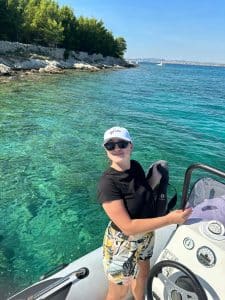
STCW Training in Holland- A Comprehensive Guide

Top 10 best places to find a Yacht job in the Med 2024?

RYA Powerboat Level 2 for yacht crew: Unlock Your Powerboating Skills
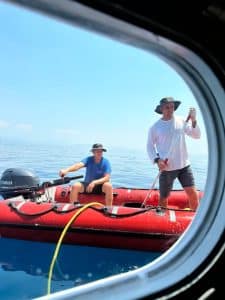
How Much Does Yacht Crew Make?

Top 10 Benefits of STCW Course Netherlands

Yacht Stewardess Training in Amsterdam

Yacht Crew Courses for Holland: Food Hygiene Level 2

Kickstart Your Stewardess Career in Netherlands!
Superyacht crew training europe.
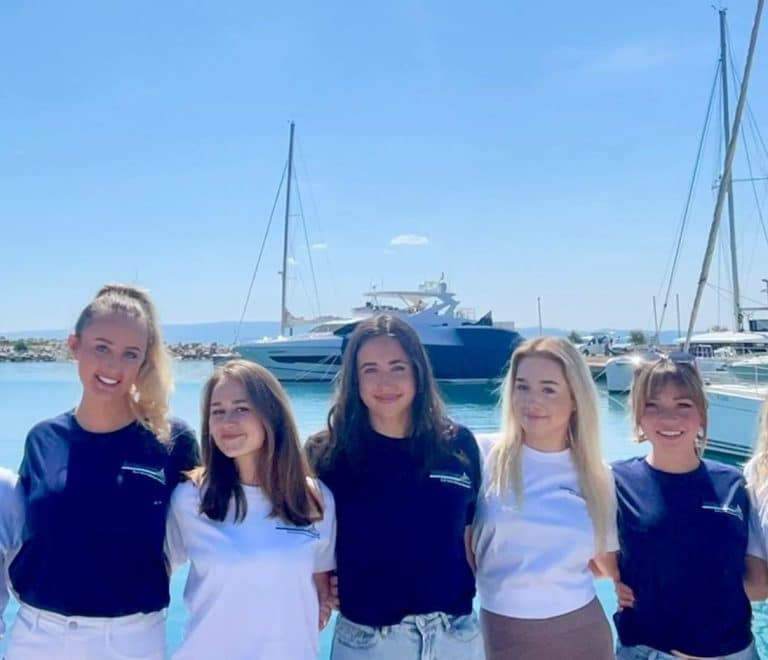
2024 Dates full. Book last 2 spots for October date with payment plan “paylater50”
Get free yacht cv and yacht job offers

What Does a Yacht Stewardess Do?
Depending on the size of the yacht, there are between 1 and 5+ yacht stewardess. The duties and responsibilities as a yacht stewardess will vary with the size of the yacht and number of crew on the yacht. Your first job as a stewardess on a larger size yacht will consist of learning the basic duties of a stewardess. Crew Mess duties, detailing, cleaning windows, polishing is high on the agenda to keep the yacht in immaculate condition at all times.
Onboard a smaller yacht with a lower number of stewardess, responsibilities will increase to more hands-on duties such as; tender driving, anchoring, mooring procedures, assist within the galley or deck operations.
The workload varies depending on the yacht, season, itinerary, and whether you have guests onboard. The busiest times are usually pre-season, boat shows or guest arrivals and while guests are onboard. A yacht stewardess position on a superyacht requires energetic professionals and as you’ll constantly be on your feet. While guests are not on board its common to have a typical 8-5 schedule with weekends off if working fulltime, if there is a trip or event with guests, hours will be much longer, and work will be much more demanding.
What are the responsibilities of a Yacht Stewardess?
- Providing 5-star service to guests and ensuring guest satisfaction
- Providing excellent guest service, silver service and bartending skills when needed
- Maintaining laundry, housekeeping and wardrobe tasks for both guests and yacht crew
- Floral arrangements and decorations
- Excellent knowledge of fine dining, wines and cocktails
- Maintenance of guest-cabin care and detailed cleaning
- Assisting with inventory and restocking provisions
- Watchkeeping within the crew mess
- Stowage for sea
- Attention to detail
- To maintain a safe and secure environment

Yacht Stewardess Job Descriptions
In bigger superyachts, the purser serves in her own capacity as an administrative presence, employed to take care of recruitment and keep financial records. The cases where the purser is employed to act is mostly when the population of the members of the yacht crew is considerable. Otherwise, the office and its responsibilities are merged with that of the chief stewardess. The Purser is charged with keeping an eye on the book-keeping, workforce management, crew member accreditations and yacht crew member documentations, crew training, monitoring the inventory and making orders for necessities and requirements like foodstuff and wine stock, crew uniforms, required utensils and cleaning materials. They also manage the protocol duties and logistics of transporting guests between the yachts and scheduled locations as well as concluding contracts for deliveries.
Your adventure is waiting...
For course schedules and availability.
Skills required: To be a purser, you must have garnered sufficient experience at least as a Chief Stewardess on smaller yachts. The administrative workload on this position demands a very meticulous level of management as well as a versatility in the skill of organization of paperwork for each division on the superyacht’s crew. Also, as the purser will be involved with the yacht owners and their guests a lot when planning for guest excursions and occasions. It is essential that the purser has strong communication skills and has efficient strategies and expertise for drafting in new yacht crew members as the requirement surfaces.
Salary expectations: There is considerable crossover between the duties of a Purser and a Chief Stewardess, but on larger yachts where both roles are filled, a Purser can expect to earn between $6,000 to $12,000+ per month .
Chief Stewardess
This role is predominantly taken up by females, hence the feminization of the position. That is not to say that there are not many famous chief stewards in charge of management in the yachting industry. The interior department headed by the chief stewardess is established to provide hospitable service for the guests of the yacht owner and the owner himself. Also, the department takes up the duties related to creating and maintaining a snug interior on the yacht. These responsibilities are not limited to Crew and guest refectory handling, detailing, cleaning, preparing the cabin, floral decoration and arrangement, burnishing, laundry and more. The Chief stewardess in charge of the management of the interior department by planning and assigning tasks to be performed by all stewardesses. In smaller yachts, the chief stewardess reports directly to the captain and is also responsible for extra duties like the logistics and planning of guest-transporting between the yachts, crew training and scheduled locations or events. They are also in charge of currency conversion for new locations.
Skills required: Attention to detail and exquisite taste is extremely desirable in chief stewardesses. The necessary skills will naturally develop after some time spent in service as a stewardess, and the ability to execute the role of a stewardess is measured by comparisons to first-class ratings; anything below a five-star rating for any service is deemed unsatisfactory. Experienced chief stewardesses are remarkably prudent, and they can divine in addition to excellently satisfying the wants and needs of the yacht owners and their guests aboard the yacht at all times.
Salary expectations: Depending on experience and the size of the vessel, the current salary range for a Chief Stewardess is between $4,500 to $9,000+ per month .
A Yacht Stewardess functions under the supervision of the chief stewardess and are tasked with making sure that the yacht interior is maintained at pristine condition while offering the best grade of hospitable service. Their responsibilities range from services like dishing food and serving drinks, filling out as baristas to domestic duties like setting the tables, preparing the cabin or doing the laundry. They are also charged with housekeeping duties which might be relegated to an entire department, which is overseen by a housekeeping head in much larger yachts. There could also be some different departments for each of the other duties like cleaning. Position Requirements: In short, while being animated and enthusiastic will earn you praises, it is more important to the perfection of the service that you able to work extremely hard with a smile on your face and pride in your ability. Also, having prior experience in delivering silver service, being a decent cocktail maker or barista will make your application a smoother process. More importantly, to be hired as a stewardess to work in a superyacht, you must have received some specific education and accreditation that qualifies you for the job. Some of the required certifications include:
Skills required: As with an entry-level deckhand position, success in this role comes down to being prepared to work hard and keep a smile on your face. Previous experience of providing silver service or having skills as a barista or cocktail maker can boost your potential to secure a job, but the most important quality to possess remains a positive attitude and a sense of pride in achieving the highest standards in your work.
Salary expectations: An entry-level stewardess can expect to earn between $2,700 to $3,200 per month . On larger yachts, the stepping-stone position of the second stewardess can provide greater responsibility by sharing some of the chief stewardess’ duties and earnings increase to an average of between $3,300 to $5,500 per month .

Yacht Stewardess Training and Qualifications:
Essential Certificates You Must Hold Before You Can Get a Stewardess Job on a Yacht are:
1. STCW Basic Training
2. ENG 1 (Seafarers Medical Certificate)
3. Passport and visas, if applicable
What does the STCW (95 + 10) Basic Safety Training course include?
- Personal Survival Techniques (STCW A-VI/1-1)
- Fire Fighting and Fire Prevention (STCW A-VI/1-2)
- Elementary First Aid (STCW A-VI/1-3)
- Personal Safety and Social Responsibility (STCW A-VI/1-4)
- Proficiency in Security Awareness (STCW A-VI/6-1)
How To Become a Yacht Stewardess With No Experience?
There is no need to question if it can be done, people get entry-level jobs as stewardesses on superyacht more often than you think. The thing they will agree on is that getting the job as a stewardess is as much about having the right certifications and skills to pull off your duties efficiently, as being able to maintain an enthusiastic outlook as you carry out your tasks.
You can start with a day job as a member of a small crew on a yacht or superyacht, depending on which you can get first. Although the work you will be assigned to might look mundane, the attitude you bring forward when working is what will set you apart for a more permanent role in the nearest future. That is not to say the right attitude is all you need if you really want to get this job; you have to consider mastering some skills like your bartending skills or your proficiency in providing silver service before considering an application.
Stewardesses are mostly tasked with either Crew and guest refectory handling, detailing, clean up, preparing the cabin, floral decoration and arrangement, burnishing, or laundry. Getting experience enough to bring your service level towards perfection is essential. A few courses or practices you can indulge in to gain experience or certification include:
Some courses/past experiences which will help you stand out from the other yacht stewardess and crucial to landing a yacht stewardess job are, but not limited to:
- Basically, anything hospitality/service related: hotel, cruise ships, cleaning, bars and restaurants
- Any spa/beauty experience: masseuse, personal training, yoga, manicure, pedicure, hair and make-up.
- Table service (e.g. silver service, napkin folding, etc)
- Childcare/Teaching: Nanny, Baby-sitting experience or teaching kids.
- Food Safety and Hygiene or cooking experience
- Floral Arrangements
- Bartending: sommelier, cocktail, mixologist, service experience
- Anything boat related: sailing, boat driving, diving, fishing, wakeboarding, kite surfing etc.

Starting a Career as a Yacht Stewardess
One thing many experienced crew members agree on that has surprised them about their yachting careers, is the sheer number of questions. You first ask yourself some questions before you begin your yachting career. You go ahead to find answers to more questions when you gain enough interest, and then you spend the rest of your life answering questions from your family members and friends every time you open your mouth to explain that you work on a vessel of luxury like a yacht. Or you reveal the experiences you’ve enjoyed and endured on your travels. Of course, you can expect the questions to be even more suffocating when a certain set of people get to know that you work aboard a ‘super-’ yacht. Ultimately, you should always be prepared for when they all ask, googly-eyed, for how to get in on the action. Can you blame them?

It is no hidden secret that yachts are synonymous with luxury nowadays. Coupled with its nature as a luxurious means of travel, the experience for the yacht crew is matched perfectly by the financial rewards sponsored by ultra-wealthy owners, the yachting industry gives people that lift into the world of the rich and powerful while offering work conditions that are a few inches short of heavenly. With the open and beautiful seas as your office, you start getting the gist of why getting to start a career in this glitzy occupation is extremely intimidating for most people.
Indeed, as a long-term career, breaking into the ranks can admittedly be a tough nut to crack. There are predictably many requirements, most of which are not on the work advert. Fortunately, a career as a yacht crew member always fulfils its promise to be worthwhile, with a lucrative, secure and perfect opportunity waiting for those who can successfully claim this profession choice. While getting a job aboard a superyacht is the lure, achieving your dreams depends on the amount of knowledge you have acquired on how to begin your journey, what type of jobs are available as a stewardess on the yacht and which of these job types fits your individual, in terms of your disposition, talent or aptitudes and capacity.
That is the sole purpose behind this little knowledge reservoir on starting a career as a stewardess on a superyacht. This way, you get a definitive idea on what will be required of you to stand a chance, as well as what you can do to improve your chances of getting a job as an attendant aboard a superyacht. All you should do now is to inject as much eagerness and resolve into your quest as you can muster, and the job will not be far from your grasp.
What differentiates a yacht and a cruise ship from a superyacht?

Simply put, a superyacht is a massive yacht, usually over 75 feet in length, driven either by motor or sail. Superyachts are predominantly owned by private investors, and they usually require that the superyachts are staffed by specialized crews. The yachts are mostly put to work for their owners, but often available to others via crewed charters. This means that while cruise ships are built to treat a large population of people, that could number in thousands or hundreds, superyachts are designed to offer a more intense experience to a remarkably less number of people, typically at most 12 people.
Over the years, yachts of different sizes have tread the seas in the yachting industry, from the average superyachts to magnificent giga-yachts that have lengths up to 320 feet. The building cost for each of these yachts exceeds hundreds of millions of dollars. Perhaps more astonishingly, the running costs for the maintenance and other necessities can be estimated to approach a tenth of the original building cost! Every year! It goes without saying that owning a superyacht is exclusive to the extremely wealthy and even to charter the vessel is a glory that those of the same status can enjoy.
With this much money spent on them by their owners, superyachts are always beautiful creatures. They are built with the most impressive methods, best materials and very grand designs. Superyachts are also stocked with enough variety, luxury and extravagance that sincerely borders on indulgence. However, the true value of these superyachts to these elites of society is not just in their beauty. Instead, they serve as a representation of their standing in society, and that is why they spend a heartbreaking sum regularly to keep the yachts up-to-date with recent technological advancements and inventions. It is for this reason that many documentaries have been made to give others an insight into the glamorous life of these top-of-the-food-chain individuals, through their yachts. More important for you to note is that there are more than 9,000 superyachts currently travelling the seas per recorded sales data, with a continually observed increase. This means more job opportunities for crew member positions.
What else do I need to do?
- Always present yourself in a professional manner
- Prepare a Superyacht CV
- Dress well and yacht appropriate
- Maintaining a respectful, friendly attitude during courses and interviews can make a big impression on potential employers and valuable network contacts
Do you have an immaculate room or are you a little OCD when it comes to cleaning, organizing and cleanliness? Well if not it won’t be long before you are a neat freak. Yacht Stews and Interior crew are masters of all. Imagine labeling every single item in your cupboards or detailing a toaster (that’s right you probably never even heard of the term “detailing” before. It basically means clean something that an average person will think is already clean. It’s not a bad thing, in fact, it’s a skill that will pay off in both your personal and professional life. If you have what it takes to be a yacht stewardess, stay open-minded, show your eagerness to learn and let your personality shine!
How Much Does a Yacht Stewardess Earn?
At entry-level, a Junior Yacht Stewardess could expect to earn between $2,700 and $3,200 per month. An experienced yacht stewardess could earn upwards of $4,000 per month depending on the size of the vessel and previous deckhand experience, training and certification. These numbers are based on an average, all yachts are different and sometimes pay more or less depending.
8 Steps to Getting a Stewardess Job:
Step 1: Research – Understanding the position and requirements Step 2: STCW Basic Training Step 3: ENG1 Step 4: Training and Qualifications Step 5: Register with a SuperYacht Crew Agency Step 6: Upload a quality CV Step 7: Network Step 8: Dock Walking – Day Work
In a quick summary, getting a job as a stewardess on a yacht can be a challenge, however, if you have read this far, the first step of the search for a stewardess job is already complete.
The next step will be to book a Stewardess Course, and you are in the right place! We offer elite preparation and training to students who want to excel within the Superyacht industry and become fully certified. If you have any questions or are interested in our Superyacht Stewardess Career Course, get in touch with us by clicking here .
Article was written by Superyacht Crew Agency

- Search our database of 89,474 crew
- Free registration
- Free job advertising
Crew Search Post a Job
- Apply for 1,040 yacht jobs
- All jobs manually checked and approved by us
- Your details secure and protected
Crew Registration Search Jobs
Featured Yacht Jobs
- 38mtr private/charter West Mediteranian cruising, Cyprus over winter.
- Deckhand Daywork – Australia– 1 month
- Deckhand/Stewardess
- Seasonal Stew/Deck 26m Private MY – Sydney Summer
- Relief Sole Chef, 3days, France, 50m M/Y
- Captain, Charter, Costa Rica, 24m MY
- Captain & Chef/Stewardess – 25m Private S/Y
- Physiotherapist
- 2nd Stew needed for 75M New Build in Italy
- Lead Service Stewardess- 85m Expedition Charter/Private- Asia, Pacific
- View all jobs
Browse Yacht Jobs
- Deck Jobs (340)
- Engineering Jobs (129)
- Galley Jobs (119)
- Interior Jobs (349)
- Specialist Jobs (46)
- Shore Based Jobs (140)
- Other Jobs (23)
Find STCW Courses:
Powered by STCW Direct
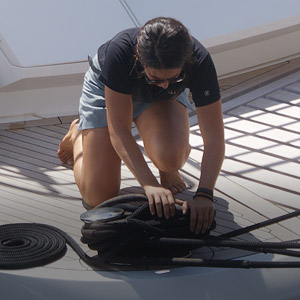
Our crew database includes 5,133 Captains, 10,037 Deckhands, 2,947 Chief Engineers, 1,313 ETOs, 5,570 Chefs, 15,180 Stews, 1,469 Massage Therapists, etc. Here are some of the recently registered yacht crew members:

Email address:
Remember me Forgotten password?
Password Reset
Enter your email address and we will email you a password reset link.
Email address:
Impartial training and careers advice
Call us: +441983 280 641
+441983 280 641
Become a Superyacht Steward/ess
- Begin a career on a Superyacht
- Career paths
- Become a Steward/ess on a Superyacht
Become a Steward or Stewardess on a Superyacht.
A perfect way to combine work and travel – and you’ll get to spend your time in the sunshine and in some of the most beautiful places in the world.
The Superyacht industry is constantly on the lookout for energetic, hardworking people, male or female, to provide guests and owners with the ultimate holiday experience.
Read on to discover answers to some of the most common questions we’re asked about being a Stewardess on a superyacht…
What qualifications do I need to work on a Superyacht?
- ENG1 medical required by all crew who work at sea. If you are thinking of becoming a Superyacht Steward/ess, then we recommend you complete the ENG1 medical before completing Step 2.
- STCW Basic Safety Training Course is a set of compulsory qualifications required by all crew who work at sea. You will complete a Sea Survival course, First Aid, Fire Fighting (great fun), and topics on Health and Safety, and Security.
- Get some experience . If you have hospitality experience or you have worked as a Nanny, Beautician, Hairdresser or Air Steward/ess, to name a few, then this will look great on your CV.
How do I get a job on a yacht with no experience?
It’s true that you don’t have to have worked on a yacht to start your career as a Steward/ess (apart from the compulsory qualifications mentioned above!).
Like any new career, though, it is a good idea to get some training in the basics so you can hold your own onboard. All yachts run slightly differently so one size does not fit all. To increase your chances of finding a job the more experience you can get the better.
The more experience you can offer the yacht, the better. So, if you don’t have any transferable skills, then Flying Fish can help .
How do I find work on a Superyacht?
There are three ways crew find a job.
- Most crew travel to Antibes, France described as the hub of yachting in the Mediterranean.
- Online, we talk a bit more about “going online” below.
- Contacts. If you know somebody that is already working on a Superyacht then through their connections it is possible to find work.
Almost everybody that is looking for a job on a Superyacht travels to Antibes, France. On arrival, crew tend to stay in a crew house such as the Crew Grapevine used as a base to look for work.
If budget is a concern then crew join forces and rent an Airbnb between them. The advantage of a crew house like the Crew Grapevine is that the owners (ex-yachties) actively help you find a job.
The way you find a job on a Superyacht is quite unique. From your base in Antibes, you would travel to other ports in the local area, walk the dock and chat to the crew working onboard to see if there are any positions available.
Superyacht crew who have the evening off will go to the local bars to unwind. This is the perfect chance to get to know people that are working on Superyachts and to build connections in the industry.
Learn more about it here
Go online to look for work
All Superyacht recruitment agents post positions on their respective websites. Once qualified, new crew would register with the agency and complete their registration form. You would then get in touch with the agent to start searching for that dream job.
The recruitment agent’s job is to match the right candidate for the job being advertised. There are many recruitments agents out there, a quick Google search for “ Superyacht Recruitment Agents ” will bring up a list.
Facebook is another medium that yachts use to post jobs. To keep up to date is it worth joining a couple of the Superyacht Facebook groups. Yacht crew jobs and Palma yacht group are two examples.
Amelia, who trained with Flying Fish in 2020, gave some good advice:
“Sign up to a few good recruitment companies, make sure you interview with the recruiter first rather than using Facebook. Second, when you have your interview, make sure you ask questions about the yacht. This is because you are not only finding a job but a home and family too, so ask as many questions as possible to make sure it’s the right yacht for you.”
How long does it take to find work as a Steward/ess on a Superyacht?
Over the 12 years that we have been running Steward and Stewardess courses, most find a job between one to four weeks. We have had customers that have found a job in a day and others that have taken six weeks to find that perfect job.
The time it takes to find a job is down to you. You will need to be proactive, up early, and make sure you are at the front of the queue. From our experience, people who work hard and explore every opportunity will find a job quickly.
Every Chief Stew that calls us for a reference asks the same questions – does the candidate have a good attitude ? You need to be hard-working, happy to work long hours, and used to mucking in. Have a can-do attitude and a willingness to go that extra mile to help your fellow crew mates.
When’s the best time to look Steward/ess Superyacht work?
Traditionally Superyachts recruit for the Mediterranean season anytime between February to May. That being said, yachts recruit all year round. We have seen many graduates find work in July and August when the season is in full swing.
The next key recruitment period is between September and November as yachts prepare for the Caribbean season. Yachts will cross the Atlantic anytime between December and January to cruise the Caribbean or the US for the winter.
Superyacht crew who have had a busy Mediterranean season may decide to take the winter off, which leaves opportunities for new crew to enter the industry.
How much money does a Steward/ess typically make?
A Steward/ess starting out in the industry can expect to earn €2,000 to €3,500 per month – almost all crew paid in Euros. The salary can depend on many factors, the main one being the yacht’s “crew budget.”
The owner or management company will agree on a budget that the Captain uses to hire crew, which can lead to small variations in the amount yachts pay their crew.
Your salary can also depend on whether you work on a Charter or Private yacht. It is customary for charter guests to tip the crew, the tip is normally around 10% of the charter fee. Chartering a Superyacht can set you back anywhere from €250,000 to €1 million per week.
Tips are split evenly amongst the crew and on average, can be anything from €2,000 – €5,000 per charter.
Is my salary tax-free?
As a crew member (or Seafarer) working on a Superyacht, it is likely that you will be out of the Uk for a significant about of time. Spend more than half of the year abroad then you fall under a specific piece of legislation called the Seafarers Earning Deduction Scheme. As a basic principle, if you are out of the UK for more than 183 days then there is no income tax on income (including tips) from the yacht.
UK Seafarers are required to complete a self assessment tax return each year. Flying Fish are registered tax agents and offer a Seafarers tax service to the yachting industry. We work with hundreds of customers to insure that their Self Assessment tax returns are completed on time.
What is it like working on a Superyacht?
All Superyacht crew work, eat, and sleep onboard. The yacht will become your home, and all meals are provided while onboard. Your contract will specify your duties, salary, working hours, and holiday. The yacht will supply your uniform and provide further training if necessary.
Superyacht crew will be comfortable with being away from their friends and family for long periods of time. For your first job, expect to be away from home for an extended period, which may be six months or more.
There are various roles within the Interior department; Laundry, Service, and Housekeeping. Depending on the size of the yacht will depend on what your role is onboard. For example, large yachts will have a dedicated laundry team, while for a small yacht (35-40M), the Stewardess will do all three.
During a normal week, when there are no guests onboard, you are likely to work five days a week, with weekends off. The structure of your working week will differ from yacht to yacht, but there will be time off to explore and have some well-earned downtime.
What’s a typical working day like for a Steward/ess?
Your working day will typically start at 8:00 am and finish at 6:00 pm, usually six days a week. When on charter, or if the owners are onboard, your work hours will differ. Unsociable hours are common when guests are onboard.
What are the cabin arrangments ?
You will share a cabin with another Stewardess. The cabins are small but comfortable with an ensuite bathroom. There is access to the internet via that yacht’s Wi-Fi system, so you’ll be able to keep in touch with friends and family at home.
Can I make a career in yachting?
Yes, and many have! Becoming a Superyacht Stewardess can be a career, and what an amazing career it can be. Every Stewardess starts out as a Junior Stew; then, as you gain time and experience onboard you can progress to 2nd Stew, then Chief Stew.
The chief Stew runs the entire interior team, manages the budget, and will be the first point of contact for the guests and owners – not an easy role.
Some yachts will employ a Purser , which can be best described as the PA to the Superyacht.
Not only is there progression, but becoming a Superyacht Steward/ess offers the travel and adventure we all seek. You will meet some of the world’s rich and famous and make some friends for life.
So, how do I become a Steward/ess on a Superyacht?
This is where we come in. Flying Fish run a two-week Superyacht Steward/ess course that includes all the qualifications and skills you need to get started in the industry. Everything from the STCW Basic Safety Training to our specialised Interior programme, run by an ex-chief Stewardess.
The course is great fun; you will learn loads of new skills and meet like-minded people who, like you, are thinking about a different career path.
Superyacht Steward/Stewardess Course
Become a steward or stewardess on a superyacht.
Becoming a Superyacht Steward or Stewardess is the perfect way to combine work and travel.
The course is suitable for complete beginners or those with experience who are looking to work as a Steward or Stewardess on a Superyacht.
Want to find out more?
Contact our team at Flying Fish today for information on our Superyacht Steward/ess course, life as a Stewardess, qualification advice and much more!
Alternatively, click on our Superyacht Steward/ess course below and kick start your new career today!
The ultimate guide to working on Superyachts
Looking For Work ?


Start a Superyachting Career
Start working on a superyacht by completing the following steps:.
- Have realistic expectations
- Select a superyacht job department
- Complete superyacht training courses
- Obtain an ENG1 medical certificate
- Select a location to join the industry
- Obtain visas & documentation
- Create a superyacht CV
- Find superyacht job vacancies
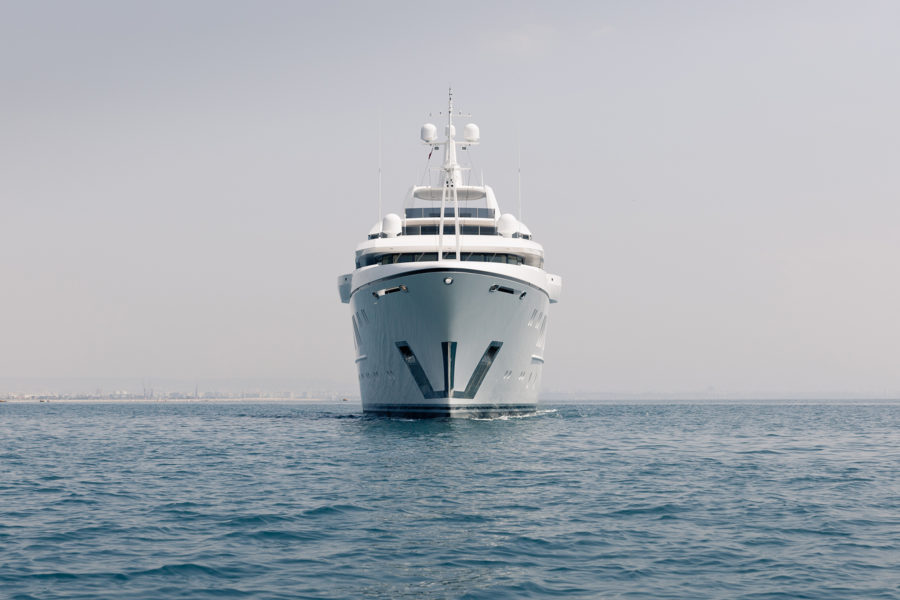
1. Have Realistic Expectations

- The superyacht industry is highly competitive and in order to qualify for employment a financial investment is required (training & travel)
- For applicants without relevant experience, being physically present at or near Superyachting hubs when searching for employment is important
- Obtaining the correct qualifications does not guarantee employment and training is not refunded
- Your passport and ability to obtain Visas have an impact on your employability
- Having contacts, experience, and the correct attitude is an advantage
- Working in the industry comes with some amazing benefits but like any career path, there are also disadvantages
- Being an extremely "hard worker" is not an advantage, it is expected
- The quality of work and attention to detail needs to be of a very high standard
- You need to be well-mannered, professional, and well-suited to living in close proximity to other crew
- Presentation matters
- Getting advice from multiple sources including crew who work in the industry is advised
- Different yachts, owners, crew, and itineraries = different experiences
2. Choose the Yacht Crew Department you Wish to Work in
Before joining the yachting industry, it is essential to decide on your career path. The work environment and duties associated with each superyacht department vary greatly. It is therefore advised that you understand the training, duties and requirements associated with each role. The most common roles for crew entering the industry are:
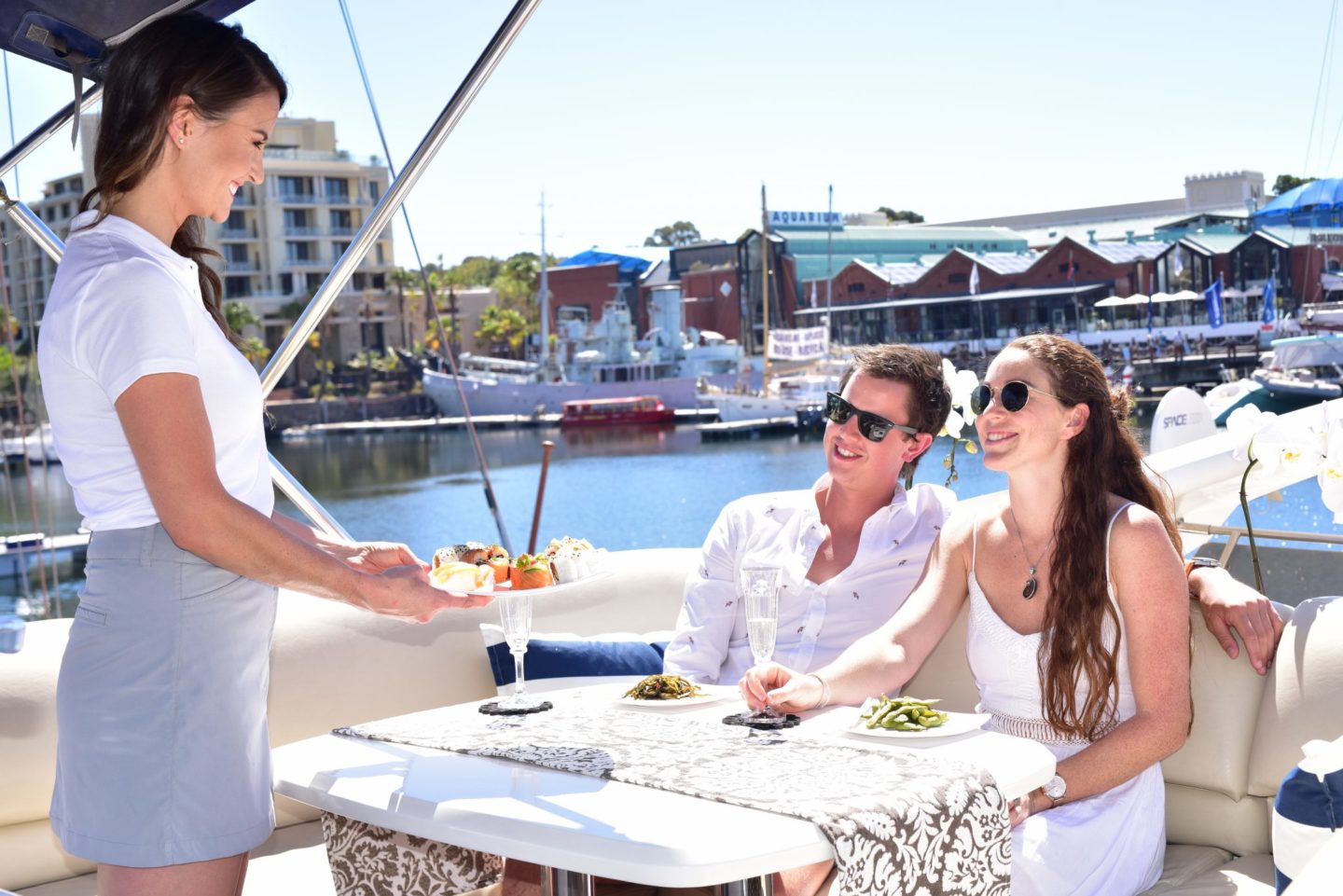
Steward / Stewardess
A superyacht stewardess is responsible for the guest service, housekeeping and laundry. In some cases, the position is combined with an additional role for those who come from a beauty or healthcare background.

Superyacht Deckhand
A deckhand is responsible for the cleanliness and upkeep of the yacht's exterior. Wash downs, line handling, tender driving, watersports and bridge lookout duties are common tasks for deck crew.

Superyacht Chef
Working as a superyacht chef comes with some unique challenges. Although the skills are certainly transferable, there is specific training and certification required. It can be a tough but extremely rewarding job.

Superyacht Engineer
Working on a yacht or superyacht as an engineer can be a rewarding career path. Although a background in engineering or mechanics is an advantage, it is not a prerequisite. The duties associated with the role are diverse, exciting and require a great deal of hard work.
3. Complete All Mandatory Superyacht Training Courses
Having the correct training and certifications is essential to your employability in the superyacht industry. In order to become a crew member, you will need to have completed the following training:
- STCW 2010 Basic training
- Proficiency in Designated Security Awareness or Proficiency in Designated Security Duties
- Department-specific training for your desired role. (I.e. stewardess, deckhand, engineer, chef, and officer courses)
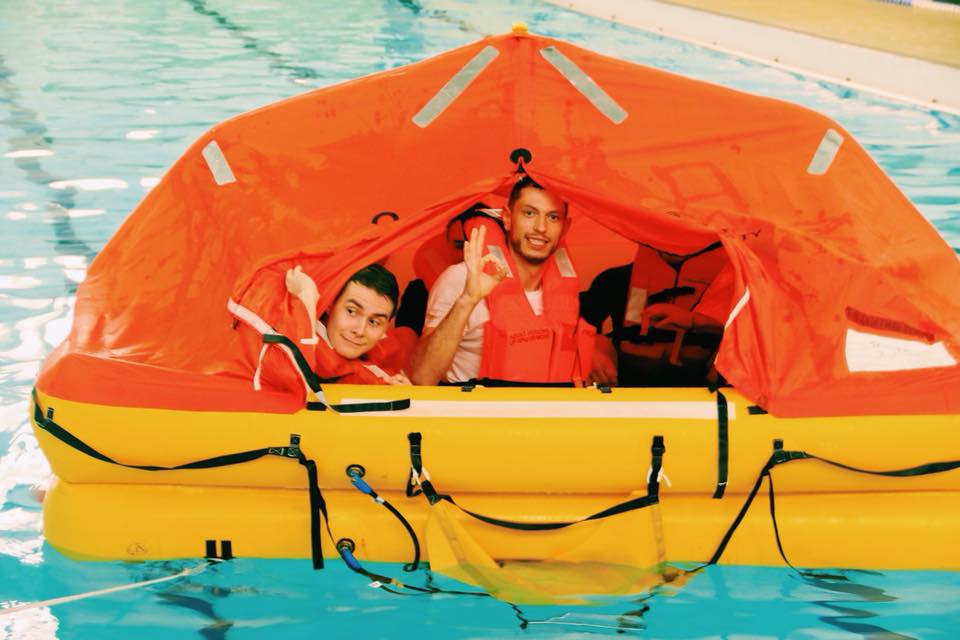
4. Obtain an ENG1 or ENG1 Equivalent Seafarer Medical Certificate

ENG1 Medical Certificate (or ENG1 Equivalent)
Superyacht work can be physically demanding. Ensuring that crew are physically well and able to work at sea is a crucial aspect of the crew and guest safety.
In order to work on a superyacht, you will have to hold an ENG1 Medical Certificate. Because the certification is set by the Maritime and Coastguard Agency (MCA), the examination must be performed by an MCA-approved doctor. The examination is done in order to identify any medical conditions that may prevent you from safely performing your work duties at sea.
5. Choose a Location to Join a Superyacht
When looking for your first job it is essential to be in the right place at the right time. There are a lot of factors to take into consideration when selecting your location, however the two most popular areas for working on a superyacht are:
6. Obtain the Correct Visas & Documentation for the Relevant Superyacht Hub
It is essential to obtain the correct visa for the country you plan to work in. It is important to understand the types of visas that exist as well as the local laws with regard to job seeking.

7. Create a Superyacht Crew CV
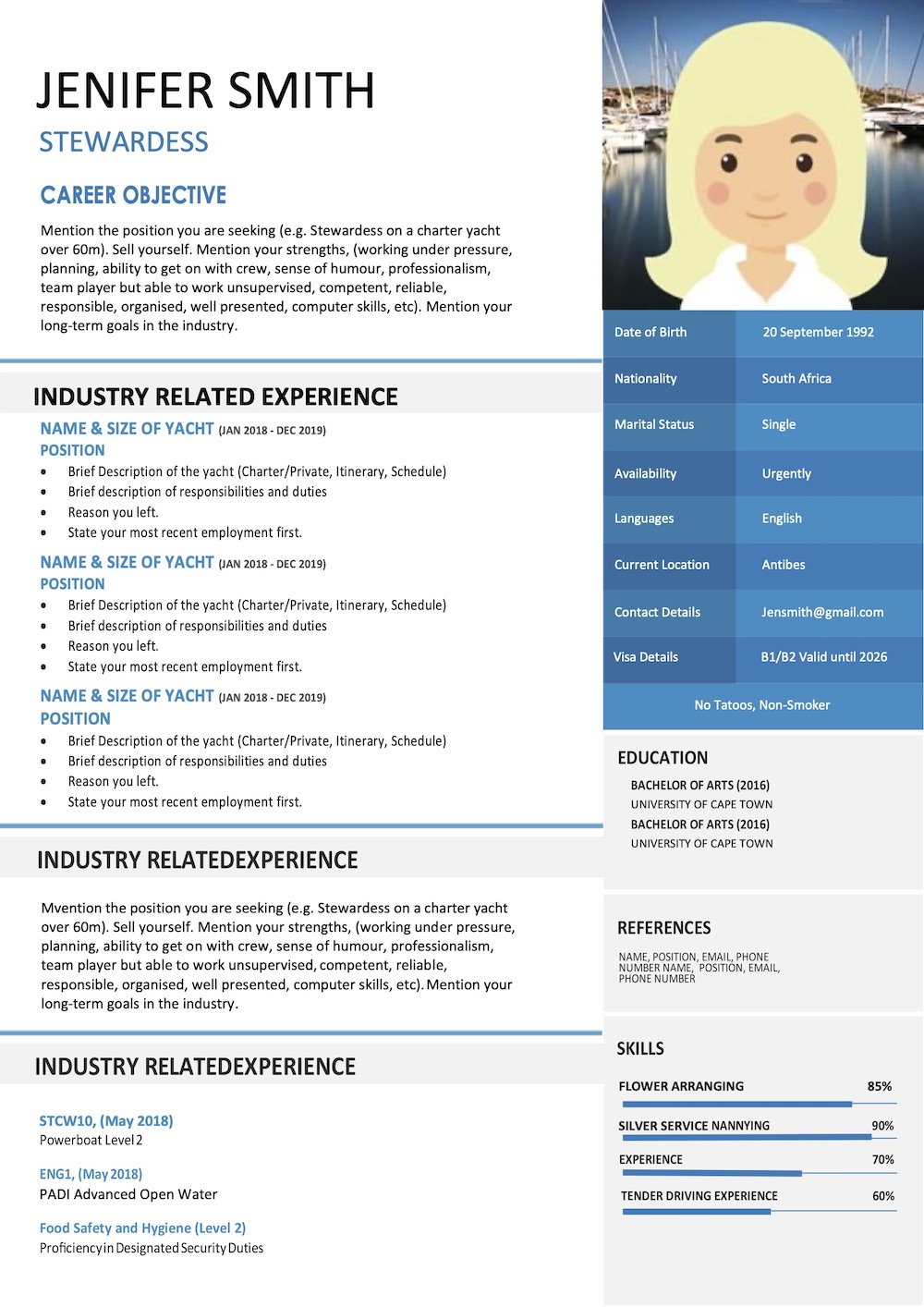
A professional and well-structured superyacht CV will help differentiate you from other job seekers looking to enter the industry.
Superyacht crew resumes have a different structure to normal CVs. If your CV is not laid out appropriately, your chances of being considered for a position are slim.
Examples and more information on how to create a great CV can be found on the links below.
8. Find Superyacht Job Vacancies
Finding the right job in the superyacht industry takes time and commitment. Using credible resources is key:
- The My Crew Kit Superyacht Job Board - Crew Agencies - Social Media Pages - Dockwalking - Networking
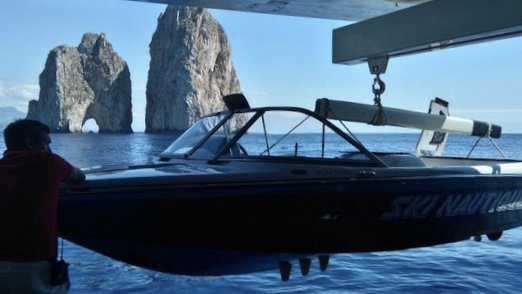
My Crew Kit Job Board:
My Crew Kit has the fastest-growing job board in the industry. Find the latest jobs posted by crew agents, captains and crew around the world!
View the latest vacancies
Crew Agencies
Crew Agencies play an intermediary role between yachts and crew. There are numerous agencies scattered around the main yachting hubs. Registering is a simple process and can be done online, many agencies will then request a short interview in person.
Find out more about Crew Agencies

Social Media Pages:
Online job boards and social media pages are extremely useful ways to apply for jobs as well as to find day work. It is important to only apply to jobs if you meet the criteria (have the correct experience and qualifications).
Be wary of which jobs you apply to. We recommend you only apply for jobs from closed social media groups with active moderators. Fake job posts do occur at times. Make sure you do not meet with or send personal information to suspicious accounts.
Find Appropriate Social Media Pages
Dockwalking:
Dockwalking is the process whereby you walk the docks with the aim of getting day work or even landing a permanent job. It is a gruelling task as there are often long distances between docks and it requires hours on foot. It also involves a lot of rejection as many boats are fully crewed and not looking for employees.
Find out more about dock walking.
Networking:
Your introduction to the world of yachting. The industry is growing exponentially; every year more boats are built, and more crew join the industry. It remains however, a close-knit community that feels a lot smaller than it is. ‘Everybody knows everybody’ and finding a job through a friend or a friend of a friend is often the best way to go. Crew like to work with people they get along with. They are therefore much more likely to hire someone from their extended network of friends than to look elsewhere (provided experience and qualification requirements are met).
A Few Suggestions:
- Network at every opportunity you get.
- Socialise with people you meet at training courses.
- Attend dock parties and BBQs.
- Socialise with the people in your crew house and visit other crew houses.
- Join yacht groups on social media.
- Hang out in the ‘yachty’ bars and restaurants.
- The more people you know in the industry the better off you will be.
Username or Email Address *
Remember me Lost your password?
Username or Email
Get New Password
I took a $13,000 pay cut to work as a deckhand on a superyacht. I don't regret it as it gave me a career I can grow in.
- Nathan Marx was a quality controller in South Africa but decided to switch to becoming a superyacht deckhand.
- Marx said the job has more growth potential than his previous job and helped him develop more meaningful relationships.
- Working around the wealthy has shown Marx that success is attainable and wealth doesn't change people's core natures.

This as-told-to essay is based on a conversation with Nathan Marx, a deckhand for a superyacht. It has been edited for length and clarity.
From 2020 to the end of 2023, I was a quality controller at an engineering company that made mining machinery in South Africa, I managed 132 employees and earned 3,000 euros, around $3,333 a month.
My future was pretty secure at the company, but I lacked that sense of adventure and felt like there was more to life than working away every day and not seeing the world as I would like.
I knew some friends who had entered the yachting industry since leaving school, and it looked very intriguing and adventurous.
My previous job had long hours and was hard work, which made me comfortable stepping into the yachting industry.
When I started working on deckhand certification courses in January this year, I was told about these massive yachting hubs where it'd be easier to find work opportunities because they were saturated with boats.
Related stories
One of those was Antibes, France. I moved there in May this year and traveled the entire coastline of the south of France, dock walking daily, exploring the vessels, and putting myself out there to catch the right opportunity.
I started documenting my job search on TikTok on the day I left for France. I was very nervous that I didn't have a job yet, and I wanted to stand out and get a step ahead in my job search. I love expressing myself through video creation, so the two went hand in hand.
I met this girl who works on this vessel docked in Monaco for the season. She saw my videos, and we got to know each other. I was the first person she contacted when they needed a deckhand. So it's all about getting in front of the right people's eyes.
My role on the yacht is to ensure the boat's exterior is pristine. Everything regarding the exterior, from the hull to the deck, to any furniture outside, is my responsibility to ensure that it is presentable for guests. I also help with basic watchkeeping when the yacht is out at sea.
Now, three months in, I'm at the bottom of the food chain and I'm earning 1,000 euros less every month than I did back in South Africa. But this career has room for growth and will keep me above the ceiling that I reached in South Africa in my management job.
One thing I realized working on yachts is that you live in the same space as your coworkers. If something bothers you about a person and you keep quiet, it builds within you and just sours the relationship on board. You have to foster a relationship with them that is a lot more fruitful than a normal employee would.
I think I also value that because not only am I getting to travel or experience all these crazy things that normal people in a 9-to-5 usually won't, but I'm also meeting people and creating connections with them that'll last a lifetime instead. That real connection with people also gives me satisfaction.
Having a life outside this industry might be challenging because anything can happen at the last minute. You might have time to spare one moment, but you're expecting guests the next, and you're suddenly back to work for a week. So whatever you have planned just needs to fall on the back burner.
But the maritime industry here sets out work-life balance very well, and I think that's also one of the things that drew me to the yachting industry because my previous job did not value my personal life. So, after the hard work, I get a lot of off time, and I have time to go and experience things and step off.
One of my favorite places I visited was a beautiful little town on a hill with an absurd history called Bonifacio, on the island of Corsica, France. We also had the privilege of hiking up into the old city, an amazing experience I don't think I would've had otherwise if I wasn't into the yachting industry.
I once spoke to a person who's been in the industry for around nine years. He told me about chartering Will Smith and all these big A-list star names, which sounded so enticing. I haven't had any of those or any experiences like that, but the individuals we meet on this boat are very high-net-worth because renting the vessel I work on costs about 78,000 euros a week.
We once had a client with 3.2 million Instagram followers on board and had a normal conversation with her. It was humbling to me because you always think these people will be different or special in some way, but at the end of the day, they're just normal people. She never mentioned anything about her success once. It was so normal that I was surprised.
It's very motivating to be surrounded by individuals like that because they make you feel that their success is possible for you, too.
The superyacht industry is unlike other luxury sectors. The places people visit are so unique that not everyone gets to see them. The cost involved is also quite exorbitant, with some yachts going for 500,000 euros a week. So, the client has a level of expectation of luxury they want to receive, and you have to live up to very high standards that no other luxury industry has.
My career can progress from here in many ways, and I'm trying to explore all those avenues. But the yachting industry is a tight-knit community that's made me very happy over the past few months, so I'll stay for as long as possible.
Do you have a story to share about working around high-net-worth individuals? Email this reporter at [email protected] .
Watch: While Delta's business is 'extremely robust,' the airline's marketing chief stays focused on the data
- Main content

IMAGES
VIDEO
COMMENTS
Yes. You will need an STCW 10 certificate to understand basic safety protocols, as well as an ENG1 Medical Certificate to prove that your health is in good enough shape to join a vessel. Get Onboard Superyacht Academy offers complete STCW and ENG1 training in Cape Town, South Africa. These are the only compulsory documents needed, but if you ...
2. Get all the qualifications in one place. Take our Deckhand or Steward/ess Courses; both provide all the qualifications (minus the ENG1 medical). These types of courses are an invaluable part of how to get into yachting, and even more important to getting yacht jobs with no experience.
To Work on a Yacht Without Experience - Make a Plan. Yachts do hire people with no experience in yachting. The entry-level positions which offer new crew the best opportunity to learn the "ropes" in yachting are: junior deckhand, stewardess, steward, or cook. The key to finding your first position onboard is preparation.
The tips depend on the size of the Yacht and the guests, but a good estimate is 10 - 20% of the total weekly price of a Yacht. If you imagine a 50m (165 foot) Yacht with 9 crew, it typically charters for $150,000 - $250,000 per week. For simplicity, let's add a 15% tip for $200,000/wk.
2. Create a Resume. Create a Resume. A resume is necessary to find a yacht job even if your past work experience has nothing to do with yachts. The personal paragraph is one of the most important parts of a resume for a yacht job. Make sure to keep it short and sweet while highlighting why you want to work on a yacht.
Step 2 - a "can do" attitude to learning. The captain will be looking for an eagerness to work hard and a "team player" - someone who fits in well with the existing crew, someone flexible, willing to go the extra mile and interested in self-improvement. Step 3 - Be ready for work at a moment's notice.
While some of the job positions onboard are very technical and require a lot of skill and knowledge, there are 4 entry-level jobs that require little to no prior experience. The most common entry-level jobs on a yacht are some variation of: 1. Yacht Stewardess / Steward. 2.
Do I need any certifications to work on a yacht? Yes, most yacht crew positions require STCW and ENG1 certifications. Additionally, specific roles may require further certifications, such as Powerboat Level 2 for deckhands or Food Safety and Hygiene for chefs. ... Can I find a yacht job with no experience? Yes, it's possible to find a yacht ...
Article Written By Meg Tonkin of Get Onboard Superyacht Academy in Cape Town. June 22 2020 . With over 12 years in the industry, interviewing and hiring countless candidates across various positions, we know first hand al the information you require in order get your first real crew job on a superyacht.
Be respectful of others. Remember you all work, eat and play together day in and day out; Be willing to be at sea and away from family and friends for weeks and maybe months at a time; Be committed. No one likes a crew member who doesn't contribute 100%; Bonus: Have experience in high-end hotel operations or hospitality
Similar to a Deckhand, no two days are the same. How to get a job on a Superyacht. The three main areas to consider are: Are you medically fit to go to sea; You will need to get qualified. Work ethic. Let's dive into the detail. All Superyacht crew must hold an ENG1 medical certificate to go to sea. The ENG1 medical certificate is used to ...
Step 5 - Daywork and experience. Step 6 - Get the right Yachtie Network and Contacts. Step 7 - Get a Strong Superyacht Reference. Step 8 - Start applying for our Superyacht jobs. Step 9 - Ace your job interviews with your coach. Step 10 - Get a job, bank account and sign contract Claim your Yachtie Careers Deckhand and Stewardess offer.
Getting started as a green yacht crew member may seem like a daunting task. You've seen all the exciting videos of yacht crew living and working on board the...
Back in 2015, when I first heard about the SuperYacht Industry, I was a 22-year old that was sitting in a classroom teaching high school students English. I still remember how my eyes lit up when I heard that I could get paid to live and work on a yacht while traveling the world. I felt unaligned with what I was doing with my life.
Stew / Cook - 30m+ Private Motor Yacht. Med (Summer) / SOF (Winter) Permanent. Qualifications: STCW, ENG1, Food Hygiene Level 2. Experience: 1 Year +. Salary: 3000EUR. Apply. Next →. The latest yacht crew jobs available onboard exclusive charter yachts and luxury private yachts with leading yacht crew recruitment company, Bluewater.
MTT MEDIA GROUP LTD trading as Work on a Superyacht. Registered in England and Wales. Company No: 15112659. Registered Office: 128 City Road, London, EC1V 2NX ...
Step 5: Register with a SuperYacht Crew Agency. Step 6: Upload a quality CV. Step 7: Network. Step 8: Dock Walking - Day Work. In a quick summary, getting a job as a stewardess on a yacht can be a challenge, however, if you have read this far, the first step of the search for a stewardess job is already complete.
Inexperienced yacht crew working as deckhands or stewardesses can earn between $2000-3000 a month. With more experience and higher positions, your salary can be between $3500-$6000 a month. On charter trips, guests typically tip 5% - 15% of the weekly charter fee, which is split between crew members.
Our crew database includes 5,133 Captains, 10,037 Deckhands, 2,947 Chief Engineers, 1,313 ETOs, 5,570 Chefs, 15,180 Stews, 1,469 Massage Therapists, etc. Here are some of the recently registered yacht crew members: Hundreds of live jobs on yachts and superyachts. Jobs for yacht crew in the Mediterranean, Caribbean, USA and other locations.
ENG1 medical required by all crew who work at sea. If you are thinking of becoming a Superyacht Steward/ess, then we recommend you complete the ENG1 medical before completing Step 2. STCW Basic Safety Training Course is a set of compulsory qualifications required by all crew who work at sea. You will complete a Sea Survival course, First Aid ...
Yacht Management South Florida 1.7. Fort Lauderdale, FL 33312. $40 - $65 an hour. Full-time. Minimum of 40 hours per week. 8 hour shift + 1. Easily apply. 4 years' experience or more working on yachts. Work will be mobile/dockside (Work Van Provided) and at our Ft.
Working On Yachts. We nurture and guide crew members through their careers from deckhands to captains, laundry workers to chief stewardesses, then in turn, provide them with their junior crew. View Now. Learn more and sign up to our newsletter. Registering with us gives you more opportunities than any other crew agency of finding a job on the ...
1. Have Realistic Expectations. The superyacht industry is highly competitive and in order to qualify for employment a financial investment is required (training & travel) For applicants without relevant experience, being physically present at or near Superyachting hubs when searching for employment is important.
This as-told-to essay is based on a conversation with Nathan Marx, a deckhand for a superyacht. It has been edited for length and clarity. From 2020 to the end of 2023, I was a quality controller ...
Income is determined on experience and availability. We are looking for a punctual, caring, gentle and sincere team player who posses an exceptional attitude. To inquire about salary/benefits please send resume.' ' Work Remotely. No; Job Types: Full-time, Part-time. Pay: From $42.00 per hour. Expected hours: 24 - 32 per week. Benefits ...
On buying the yacht, the couple wanted to show their daughters, who live in Chiang Mai, Thailand with Bow, that you don't need to know everything and can still try and work it out.